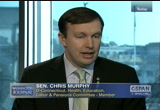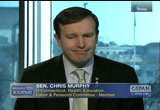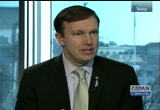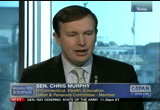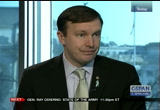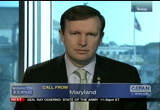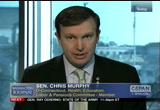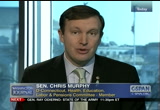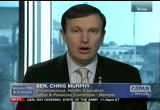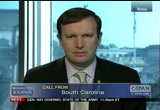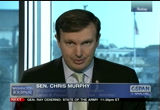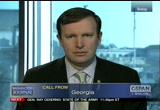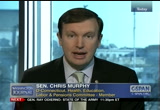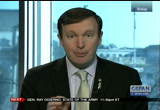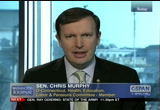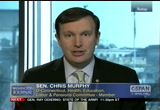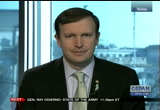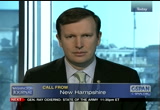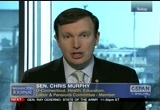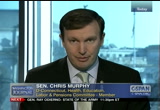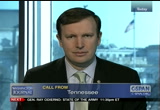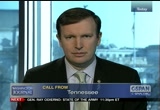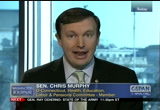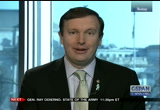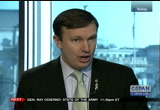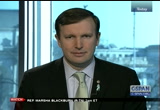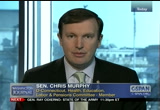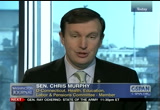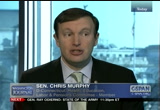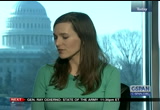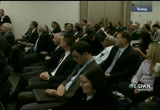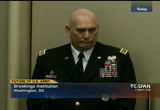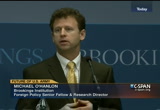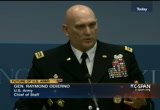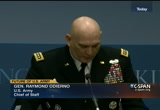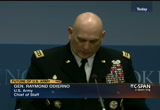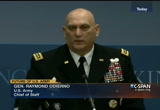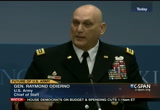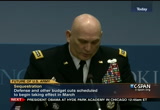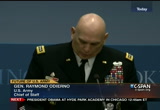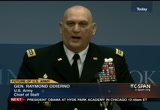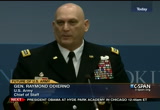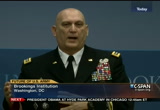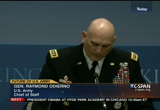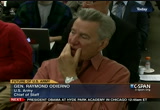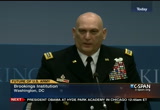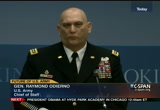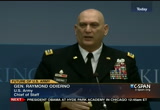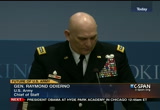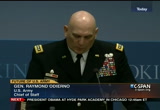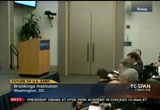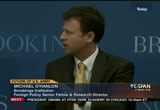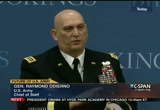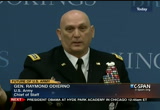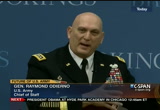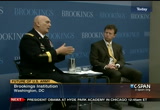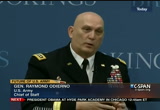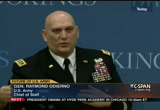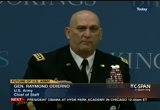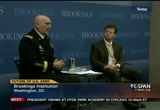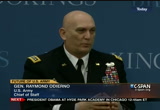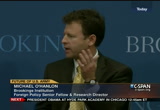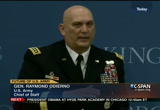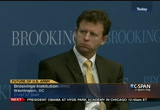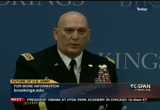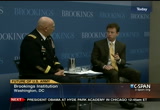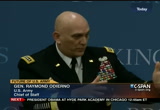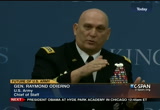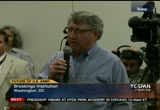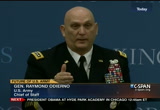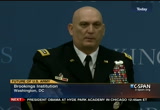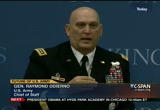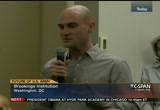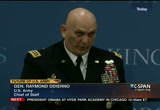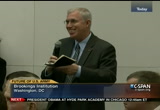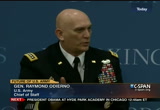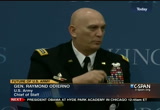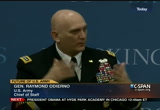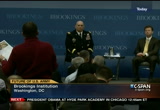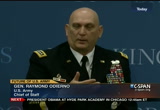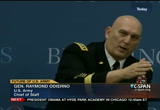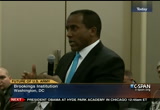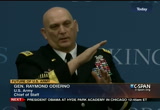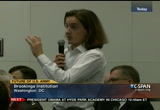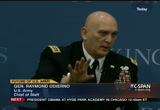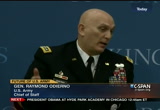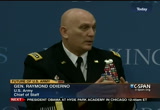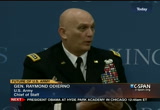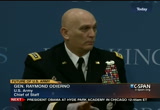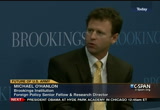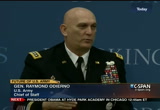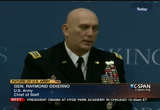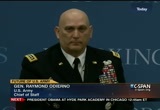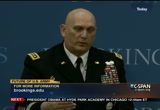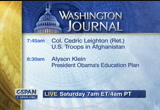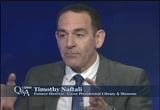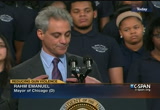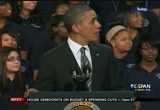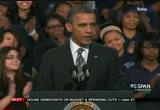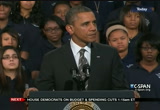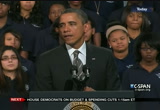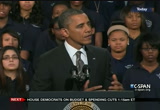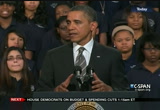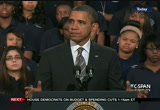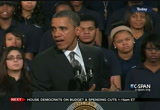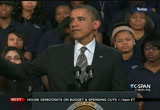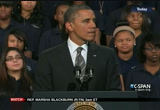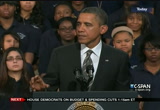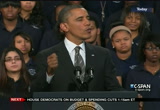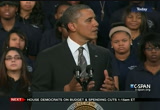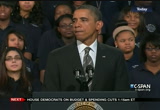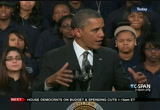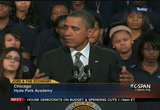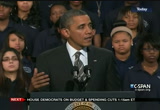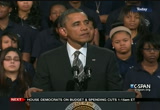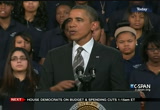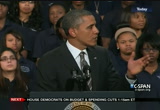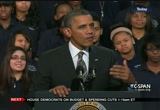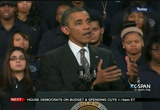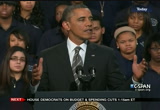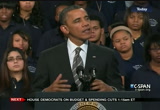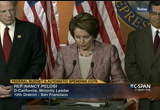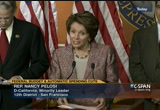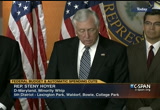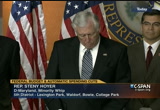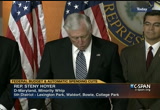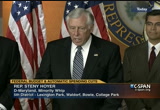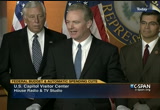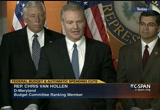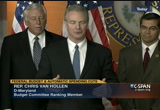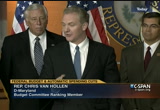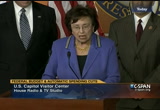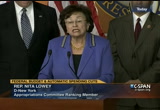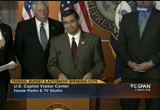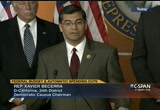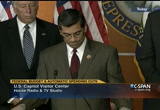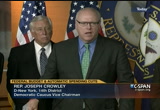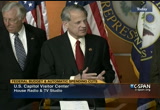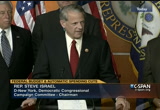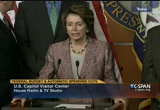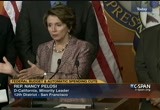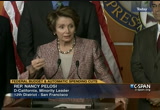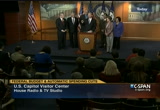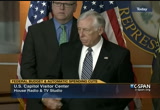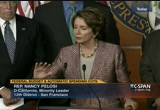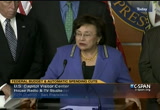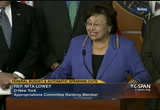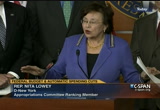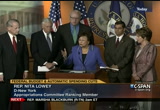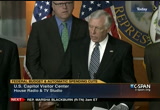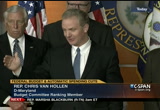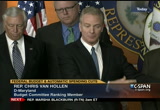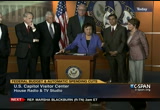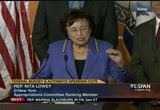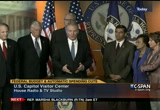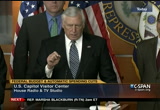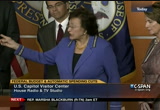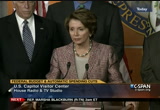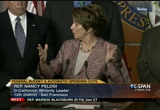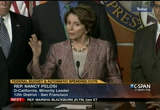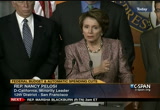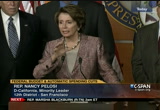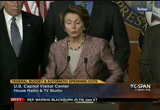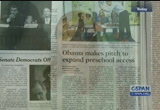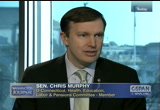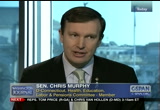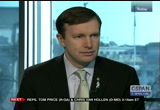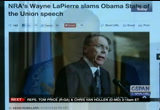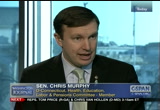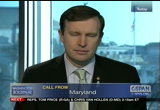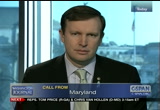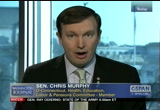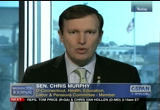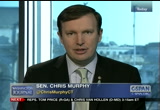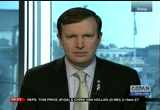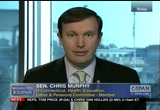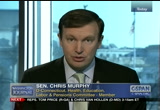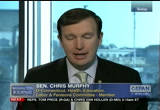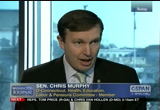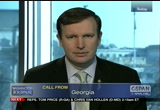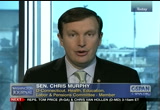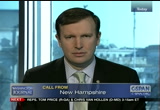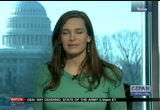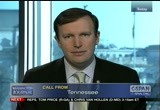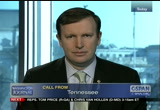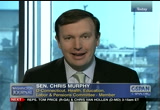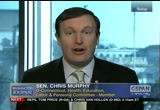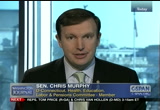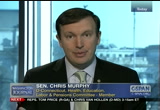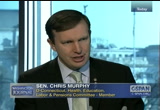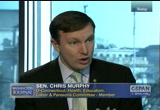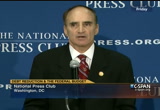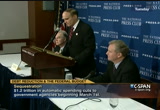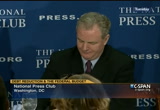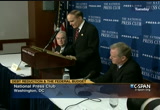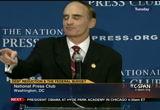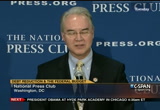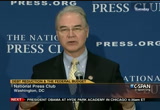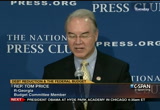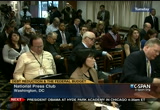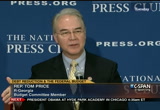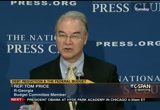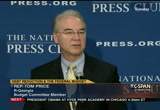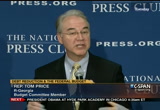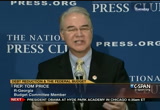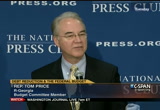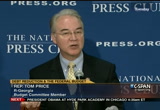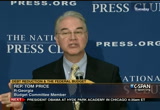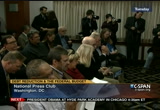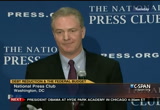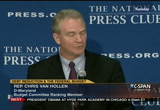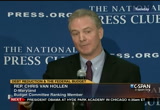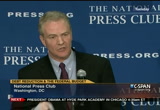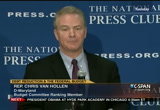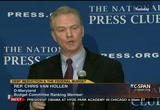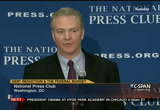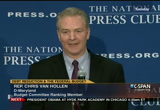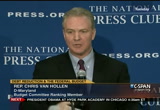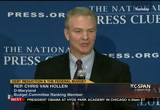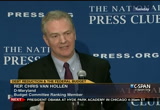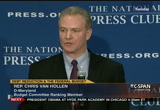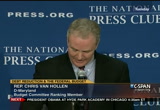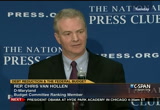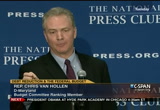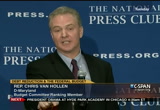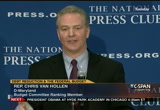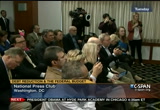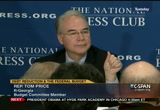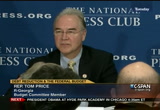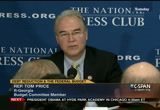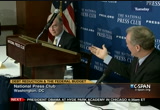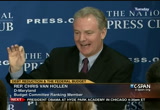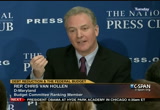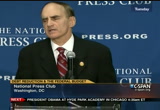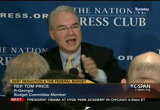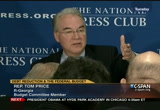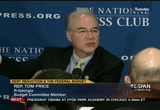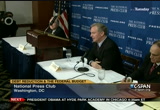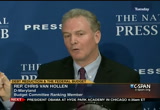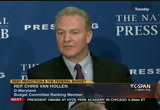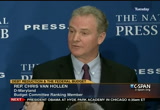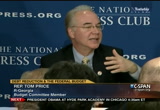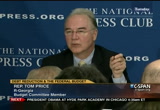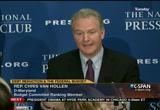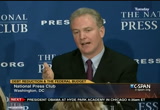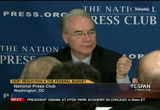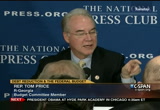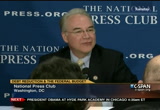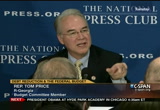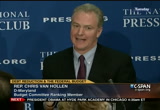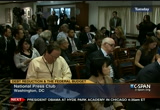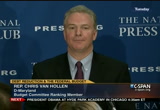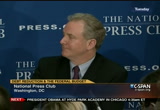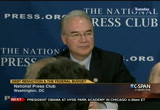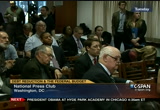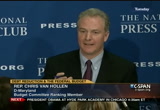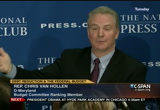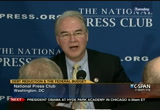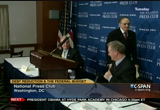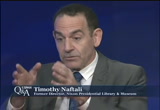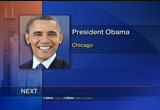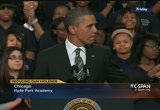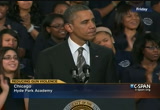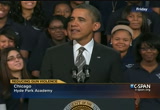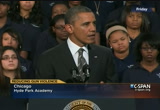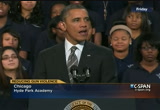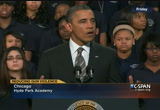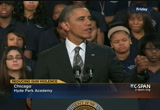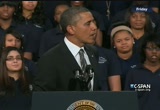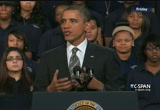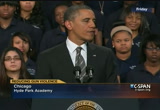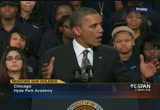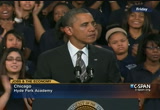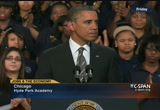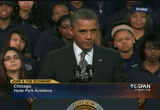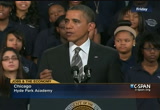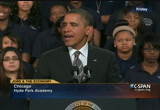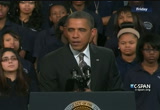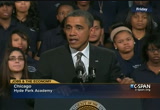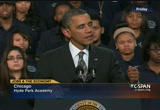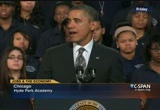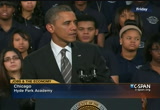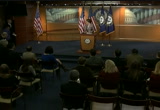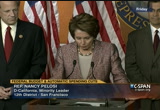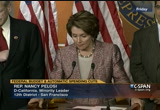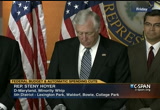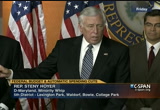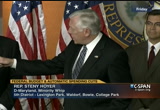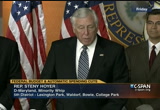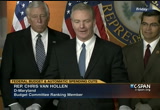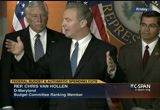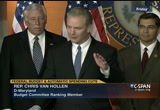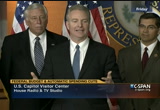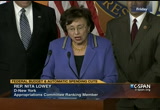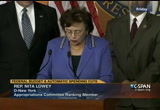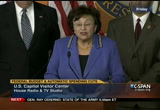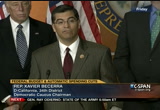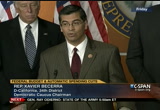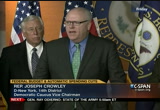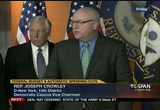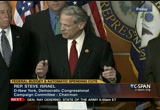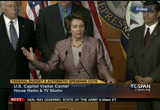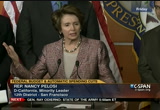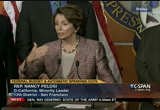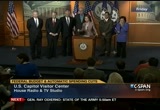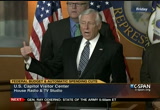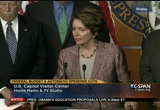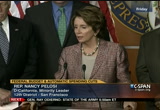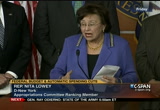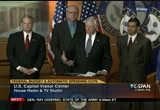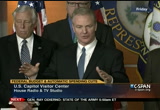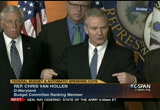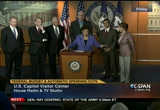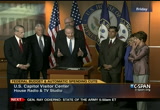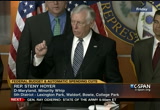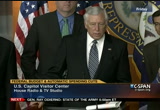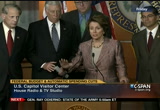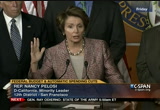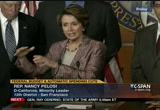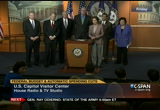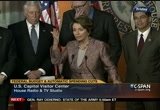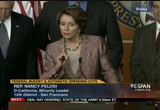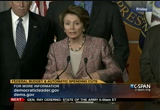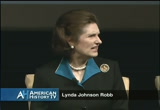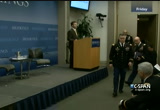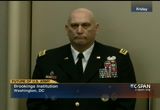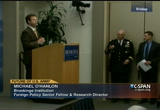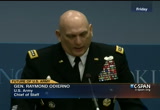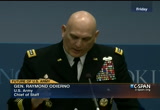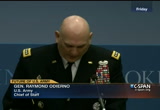tv Politics Public Policy Today CSPAN February 15, 2013 10:30pm-6:00am EST
10:30 pm
hello? steven, are you with us? let's move on to parents in maryland, on the republican line. caller: thank you for taking my call. i agree with congressman blackburn on the lack of leadership from obama. i think he is out campaigning all the time across the country and across the globe. we have real problems here. we really need to solve them. i think the reason republicans have had to do what we have had to do is because we have a lack of leadership. there is nobody bringing republicans and democrats together. the president should as leader of the nation. he is not in the white house. he is not in the white house. host: who do you see as republican leaders?
10:31 pm
caller: i think they are representing my ideas, my belief system, and my conservatism. i think they are doing the right thing. host: any leaders in particular? we saw senator rubio give the gop response. caller: i think mark rubio, john mccain, ted cruz, a lot of these congressmen who have been in government for a while, and some of the new ones are doing the job that they were sent there to do. they are representing the constituency from where they are from. the democrats do the same. i know we have differences on both sides of the aisle, but i believe that being able to -- being able to work together and coming together as a nation and congress has a lot to do with barack obama as the president. he was reelected. he needs to be in the white house. he needs to lead this nation.
10:32 pm
he does not need to be out in campaign mode. that is all i have seen from barack obama. campaign, speech -- let's get everybody in the white house, and let's get things done. guest: a couple of points -- we hear this from constituents, that they are frustrated that they are not seeing the leadership. what he is saying really plays into that. leaders are team builders. they know how to bring people forward to find consensus. the president's speech the other night was all about the president and about his plans. it was not about the items that are on the wrong track in this country. it was not about coming to work with us. indeed, the president said, if you do not pass this, i will do it by executive order. that is not leadership. that is not what people are wanting to see.
10:33 pm
people want to see us sit down and work these issues out. second thing -- when you asked him about who he sees as a republican leader, one of the interesting things that i think he and others see is, we in the republican party do not have one single standard bearer. we have lots of individuals across the country, at a local, state, and federal level, who are moving forward in leadership positions, men and women, who are carrying forward. that is because we as a party put the emphasis on individuals developing their skills and talents and abilities and using those for the betterment, not only of themselves, their families, but their communities and their country. host: bill joines -- bill joines is on the independent line. -- joins us on the independent line. caller: president obama was
10:34 pm
reelected by a pretty healthy majority. we reelected him because we want $9 for a minimum wage. we want women to have a contraceptive coverage within their health care plan. their employer should not be a factor. we want a ban on assault weapons. we want large clips banned. if weapon is found or used in a crime, the serial number should point to the registered owner. education -- we want the government to either provide or help states provide early childhood education for children. obama was reelected. i wish republicans, instead of standing in the way, would jump on board, because the liberal
10:35 pm
agenda is going to move forward. thank you, and have a good day. host: he has his opinions. what do you make of what he said about early education? he was in georgia, close to where you are from, talking about preschool expansion and early education proposals. guest: i had an e-mail from a teacher as they were giving this speech. it was somebody i have known for a long time. it was -- are you kidding me? more paper work. so many of our educators, when they hear these programs coming from the federal government, they are thinking, that is another slip of paper work that i'm going to have to do. teachers are so weighed down with that. teachers i am talking to, the one state and local control, off-site based decision making. they do not want the federal government. they would like to see states
10:36 pm
with control of education and would much prefer that than having the federal government come up with this initiative and that initiative. they know what works. let them teach. host: if there was local control in your district, would you approve of the ideas like preschool? guest: they're working with the parents and teachers. let them do it. do not put something out here from the federal government that is going to be another incentive to pull you in, and then the hank the money and you have local governments-- they yank the money and you have local governents -- let parents and teachers make these decisions. host: marsha blackburn is a representative from tennessee. barbara, from maryland.
10:37 pm
guest: i am republican in full support of president obama and in these wars. i am an anti-war person. i think it is a misallocation of our resources. i am sick and tired of my party always pushing one more after another. it seems like this is a business. that is why we are conducting them. my second point is, you talk about free markets. we do not have a free market anymore because the free markets or the markets are manipulated by the people that control the money, as well as the industries. that is what globalization is all about. here's one last point -- for example, electric cars, solar panels, that was something that was around 40-50 years ago, and former president carter even had solar panels on the white house. if our government would have been smart back then to continue that trend and take one oracle -- 1-2% of our economy every
10:38 pm
year to convert to green energy, we would be much further ahead. i'm so tired of the republican party to always be anti-green. we have an issue on this planet. i would like to see some things done in regard to that. green energy is important, and we should pursue it. thank you so much. guest: nobody is saying that it is not important. what they are seeing is that the federal government does not need the department of energy -- it does not need to be putting money into loan programs for companies like solyndra and fiskar. others -- they have gone bankrupt the. have gotten hundreds of millions of taxpayer dollars for loan programs and all of those companies that got those loans with that taunt of money have
10:39 pm
gone bankrupt. something is wrong with the vetting process and something is wrong with technology that it is not working in the marketplace. i had solar panels on my house in tennessee as a test keys thursday as a test case 30 + years ago. they're looking to see if we could get enough heat units per day in solar panels. we never got enough to run our hot water heater. we were happy to do it and see if it worked. we are saying let's bring things to the marketplace that will work but let's let the market decided it does not have to be taxpayer money that is being used as venture capital to see if unproven technologies are going to work. host: "from the washington post."
10:40 pm
what do you think of those proposals? guest: i think we need to look very carefully at wind power. are we generating a lot of wind power and the answer to that is, across the country, some areas are successful and some are not. you take our area in tennessee and you look at tva and the electric power generation source and see what you are pulling in that electric power generation bred from wind power and it is a miniscule amount, even on the best days. you have to questioned that. you'll notice that what the president is trying to do is disallow coal. i think it is inappropriate to disallow our national -- natural
10:41 pm
resources especially one where we are so rich in coal and there are clean coal technologies that are out there. i've got some problems with where he is trying to go with renewable fuel standards. host: our next caller is from ohio, on our democrats line. whatever are you from? go right ahead caller: you had some good speakers before me. my father worked 41 years in a factory. the people have spoken and obama is the president. what is wrong with the old days where we got behind our president and did something for the people? the people have spoken and i want obama. they want what he stands for and i challenge all the republicans to spend a weakening nursing home where my father is at and see how we take care of our older people it is shameful it is shameful to be in a country so rich and we get so little to
10:42 pm
our people white is it an entitlement for someone who worked 41 years n.a. factory to get social security? how was that an entitlement to? guest: i did not say it was an entitlement. i said that medicare and social security are trust fund for you and i are in agreement on that. it is a trust fund for it because federal government has had first right of refusal on your money. they take that out of your paycheck every yourperiod. heirs money that goes to medicare and social security and i think it is just is so inappropriate that the federal government does not use that as a trust fund but they move immediately to the general fund and stack up iou's that are sitting in a cabinet in west virginia. we need to make certain that individuals know exactly how
10:43 pm
much of their money has gone into their portion of social security and that they have the assurance from the federal government that those obligations are going to be met. right now, i think it is so sad that we are at a point where we are taking in less than we are sending out with social security. it is because those funds have not been set aside in a trust fund as they work legislatively and by law as opposed to -- as they were supposed to have been done. you look at those two trust funds, stabilize those and entitlements are medicaid which is the largest of the entitlements. the spending runs on autopilot. if any of your viewers like to
10:44 pm
go to my website, there is some explanation on the federal budget and the difference traunshes. there is non-military discretionary, the fans, your trust funds which are medicare and social security and your entitlements. all of those different pieces of pie form the full federal budget. host: from twitter -- how can the house republicans be a leader? guest: the way we do is through our actions and that is one thing that has been so incredibly frustrating to the american people. one of the callers earlier said that actions speak louder than words. tell me what you are going to do. take the action. what the american people want to see is across the board cuts from that discretionary spending
10:45 pm
that will take place and stand firm and allow those spending reductions to go into effect on march 1. house republicans are standing firm and they are going to allow those reductions to take place. i think your listener on twitter would probably like to see us lay out an orderly process, other items we will reduce in the federal budget. there are so many things when you look at the inspector general's report where there are redundancies in programs. here is an example -- economic development programs -- we've got 340 to economic development programs. we really knows? >> -- do we really need those? start to break them apart. economic development is the jurisdiction of the local and state governments.
10:46 pm
it is not even the jurisdiction of the federal government. focusing on what should be the priorities of the federal government and beginning to whittle the size down and get back to those constitutional priorities, getting back to the things that we should do and priority number one is to provide for the common defense. host: leon panetta has 1 foot out the door but the white house says he is not leaving yet as we await what will happen in the senate with the chuck hagel confirmation process. do you want to see that move forward? guest: i think there are real problems that lie ahead for chuck hagel in this confirmation process and people are uncomfortable with some of his past statements. i know he is the president's choice but i am not so certain that it will happen. host: are you concerned about having a defense secretary in place? you said you'd like to see some of the defense cuts haeded
10:47 pm
off? guest: i think everyone has concerns with that and they want to make sure the pentagon and military posts have strong seasoned leadership teams. regardless of having the secretary or not having one is a portent concern. -- a point of concern. you have a good strong team that will be able to manage through this process. they have seen this coming. as you would expect the military to do, they are prepared. host: new hampshire, and the pennant caller -- caller: morning and thank you. i am so tired of the irresponsibility of the republicans. the chuck hagel thing is preposterous. how does it serve the nation to delay the president's choice? it is the first time in history that a filibuster has been used
10:48 pm
against a cabinet the sequester is the height of irresponsibility. why risk a potential double dip recession just so you can score political points? finally, you criticized the president for being out of washington and yet, -- that was and finally -- hear you are supporting a filibuster and finally, though you partly answer the question or just now, what your district and tails are large installations, i assume, other than fort campbell in your district. my brother died from the 101st airborne in fort campbell. i am familiar with that so thank you. guest: thank you and thank you for your family service and
10:49 pm
dedication to our country. the 101st airborne is one of the divisions that is there at fort campbell, the 160 a special forces, the fifth division, and they are all wonderful men and women who serve this country so well. we thank you and your family. what we would like the president to do is focus on solving problems. we talked to constituents every day and they want us to get the problems solved. it would be wonderful if he were to return to d.c. and say to members of the house to sit down and discuss these issues. members of the senate, let's sit down and discussing this, but that is not what is happening. host: to members of congress spend enough time in washington? guest: i think they do. with the availability of technology, we can work in the
10:50 pm
district and we are able to meet with our constituents and hold meetings. it helps them to not have to come to washington to see us. i think it is a very efficient way of doing things. host: the next caller is from indiana, democrat blind. --line, caller: i would like to ask about the defense. we have military bases in 170 countries. they are not there for free. how much money is going to them and to the country's? guest: what he is talking about is getting to one of the points that many of us as republicans have made.
10:51 pm
we need to provide the defense department with the flexibility that they need to manage the funds that have been appropriated. there may be one traunch of money but budgets are done in five and 10-year traunches. you will see some legislation that will allow the defense department to re-program some of that money and move it from one silo to another and that is the kind of flexibility -- when you see this states and your counties and cities do that across the board -- spending reductions generally, they do it with flexibility to the different departments can re reprogrammed-and replace and adjusted. that's the way it should be. host: from twitter --
10:52 pm
guest: the keystone xl pipeline is a good point. it has been awhile since the president has delayed a decision on keystone. as bipartisan support and the governor of nebraska has said let's get this rolling and keystone is a great idea. that would be a great first start. permitting some oil exploration and drilling and development is another one in that same sector. you can look at what has happened in north dakota with the amount of drilling and production. another thing the president could do today that would lead to job growth is look at his federal agencies.
10:53 pm
the federal regulatory agencies have 291,000 employees. 291,000 employees. last year, they issued 4000 new regulations which are thousands of pages of instructions and the federal register. that -- he needs to for -- it makes it impossible for new regulations. he should allow a review and get some of these regulations off the books. i talk to small business manufacturers every single day who are telling me about how difficult the epa or osha or different agencies are making it difficult for them to do business. we had a terrific manufacturing showcase yester day with items that are being introduced into this country from our district with those manufacturers.
10:54 pm
lee terry out of nebraska is chairman of the subcommittee and we had a great showcase. it is regulation, uncertainty in regulation, and tax policy and talk to bankers across this country. the fdic has uncertainty. all of this is making the process of business very difficult. if you want to create jobs, let's get back to what we know works. it is less taxation,plus, less litigation, plus, less regulation + more innovation and more jobs. it works every time. host: the republican from south carolina is next. caller: thank you very much if
10:55 pm
the president were to call you in to 1600 pennsylvania avenue. with your position on energy and things you are interested in, to increase jobs, if you could make a change or suggest a change to the president and the congress, how would you make a change so that energy would increase into more jobs it even into the millions of more jobs? what would be your suggestion that we could do that would cause us to be able to turn more natural energy such as using this area of the country that you are from, tenn., into energy that is going to help us to be more self-sufficient and create more jobs and actually use the money we are paying in taxes to do that so the poor people can increase their jobs?
10:56 pm
guest: the need for jobs growth is the point. it is also the need to get the price of a gallon of gas down at the pump. it has doubled since this president went into office. my constituents consider that to be a tax on you. it is especially at a time when household income has gone from being $53,000 down to about $50,000. you have seen that diminishing household in come and health insurance cost is gone up about 20%. all that has an impact. groceries are up because of logistics, the transportation packaging, that comes from oil derivatives. it is all costing more. tying back into the previous answer that we gave to the twister participant -- you got to pay attention to what is
10:57 pm
happening on the regulatory front. if the president invited me to 1600 pennsylvania avenue, i think i would take a business card and put my mouth formula for job creation which is less litigation + less regulation = more innovation and job creation because we know it works. you can take that formula to the bank. if you talk to our small business manufacturers, whether they are making autoparts or aftermarket autoparts or whether they are working in the interactive technology space or working on the backbone of the internet with broadband -- whether it is the fcc or the fda or the epa, any of the alphabet soup, what they do is to limit your ability and a cause uncertainty and overreach in the
10:58 pm
regulatory community. there is uncertainty and overreached in the tax base. want to see this reduced so they can get back to doing what they do. and host: is there a way to find a compromise with the white house? guest: my hope is that the white house will compromise with tax policy and regulations? host: show blackburn represents the seventh district of tennessee. thank you so much for joining us. >> also on "washington journal" we spoke with chris murphy. this is 35 minutes. host: senator chris murphy from connecticut. prior to joining the senate he served three terms in the house. you're new to the senate and yesterday the senate took a vote for the president's nomination of secretary of defense. here's the headline -- how is
10:59 pm
the senate different from the house when events like this happen? guest: yes don't confirm nominees like hagel so this is my first time through a nomination process like this. it's too bad it has to be like this. there's a long history of giving presidents up and down votes on their nomination. and it shouldn't have been like this. chuck hague is qualified for the job. he is someone that his colleagues know very well. this idea that the republicans profitted on the floor and they need more time to know who chuck hagel is. they served with him and they know him and he has been out in the public view for a long time now. i hope we'll get an up or down vote after the break.will get ae after the break, and republicans would be ready to vote for him
11:00 pm
or let him proceed to a final vote will we get back from recess. this is an unfortunate hickok and the confirmation process. we hope there is no great international crisis that happens over the next 10 days. and we are effectively without a secretary of defense, my hope is that we will get to a confirmation vote and a successful one when we return from presidents day. >> one of the areas, you have been working on gun control issues. the momentum and uncertainty in connecticut, the gun debate, what is going back to your home state in terms of passage of legislature, what is the momentum like right now? are you concerned that that is shifting away? >> there was a rally at the capitol in hartford were 5500 activists that are seeking state
11:01 pm
law changes and the measures came to the capital. that may be the most i have never seen it in my short years in public life. they already have some pretty strict gun laws. an assault weapons ban, and got an airtight one, but a pretty strong background check. they don't need to travel as far. but they will get a very strong of a and provide some information to us. much harder to get a bill passed in washington because of the resistance to do gun measures, but the nra a couple days ago called what happened in connecticut and the aftermath of the kinetic effect, i think is an unfortunate way to put it into the extent that the gun lobby thinks that the desire for gun-control is going to be
11:02 pm
saved, i think they are wrong. i hope we get it in the coming months, and an appetite for strengthening gun laws to protect kids and families for a long time. >> your fellow democrat from connecticut have issues and recommendations, working on gun issues. would you like to see the white house do and what the senate and the congress can relatively do? >> i think it is the strongest bill possible. i'll see any reason why they should be on the streets today. i don't think that any law- abiding citizen needs and magazine filled with 30 rounds for 100 rounds in order to go out and enjoy their sport. we need to say that weapons designed to kill people should stay in the hands of the military, weapons designed for that should be in private hands. that is part of the to do.
11:03 pm
in the background check side of the equation, but just as important as far as i'm concerned. republicans and democrats meeting in the united states sent to try to put into place with a principle that anyone should have a background check to make sure they are not criminals and they adjudicated if so mentally ill that you should not have a weapon. we do a lot of good if we took some of these very dangerous assault weapons and high- capacity magazines off the streets as well. >> expanding the assault weapons ban to include these magazines and improving the background check system. having background checks and rules for manufacturers and also federal trafficking of guns as well.
11:04 pm
slamming the president obama state of the union speech, he accused the president of abandoning the cause of school safety saying that the president displayed on a level of political fraud and public deception that cannot be ignored. >> that behavior is bizarre. we were hopeful the gun lobby would come to the table and tried to help put in place common sense and the measures. what they have become is really a representative of a very extreme wave of gun owners, and a lobby for manufacturers. they used to lobby for restrictions on gun ownership. and this sort of fantasy world
11:05 pm
that he lives then, he thinks that the agenda behind those of us that want to keep kids safe is to take guns away from members and legitimate gun owners is a lie. i hope that he and his colleagues stop saying it because i am a supporter of the second amendment, the real second amendment. i am a supporter of the second amendment that says everyone in this country does enjoy a constitutional right to either issue for sport or protect themselves, but there is a line that can and has been drawn in terms of what is reserved for private ownership. it has nothing to do with some bizarre secret agenda that he thinks exists to take people's guns away from him. >> here are the numbers to call.
11:06 pm
let's go to the phones and hear from patrick joining us from maryland. >> thank you for taking my calls. a couple questions for senator murphy, he mentioned that the second amendment is a constitutional right, but my interpretation of the constitution, the bill of rights are inalienable and protected by the constitution. it seems like there is always, no matter what side of the aisle, politicians are coming from either democrats or republicans and they use a tragedy to push forward an agenda that has nothing to do with the assault like 9/11. i'm sure senator murphy doesn't want the amendments because of that sale.
11:07 pm
democrats can push forward an agenda on taking away gun rights of law-abiding citizens, it is not right and not what politicians are there for. i wanted to comment on that because i feel like a lot of times, democrats championed for civil-rights and the first amendment should not be compromised. i do not know why the second amendment feel the same way. >> i and this is an important thing to talk about because there is a perception on behalf of the second amendment and maybe supporters of the first amendment that they are absolute rights. who have never been absolute right. those are rights that come with conditions. the first amendment protect your right to free speech but it doesn't protect your right to yell fire in a crowded theater.
11:08 pm
it does not protect your right to defame a neighbor or another individual in your community. it gives you that right with limitations. at the same thing with the second amendment. it protect your right to own a firearm but it has always come with limitations. the decision that came down from the supreme court a few years ago, they said just that. the second amendment guarantees a right to have a firearm but it absolutely comes with limitations. we know there are certain military-style weapons like fillet and automatic weapons that are not allowed to be in the hands with private citizens. recant on a tank or a fighter plane. conversation,hat where the line is drawn. a very common phrase in this debate, that it would not have
11:09 pm
prevented what happened in newtown, that is absolutely wrong. this madman walked into this school in connecticut, got off somewhere north of 100 rounds in 10 minutes, and as in other tragedies, what possibly cause of the interruption of shooting was the exchange of magazines. that's what stopped the shooting in tucson and aurora. common sense will tell you if you have to change clips 10 times to get off one underground for rather than two times, their car a lot more opportunities for that shooting, some of these guys get a sense of false courage from walking into a school or a movie theater or a church with an assault weapon in the first place. and they didn't have access for that kind of high-capacity
11:10 pm
weapon and they might not have started the shooting at all. i think and the families believe that had assault weapons ban illegal under the terms we are proposing right now and had high-capacity magazines been illegal, it is likely there would still be kids alive today. i believe this law would have made a difference. >> serving on a variety of committees including the labor and pensions committee. and foreign relations or he was named chairman of the subcommittee on european affairs. that oversees matters of the european union and the organization for security and cooperation. let's go a robber in colombia. -- to robert in colombia. >> good morning.
11:11 pm
congratulations for ascending into the senate. i have a couple comments here. i would like to encourage everybody to watch the movie lincoln and that senator chuck a goal seems to be qualified. there is a lot of money wasted in the military. he seems to be well-qualified and politicians need to be for the country, not for parties. if he is approved, he would be very vigilant and at the same time, keep a sharp eye on the lookout for the military in this country.
11:12 pm
>> let's get a response from senator murphy. >> i agree. imagine something important, he would be the first enlisted soldier to become secretary of defense. you don't have to have been in the military to be a very good or great secretary of defense. this certainly gives the skills that that we have not seen before. he has bet on the front lines, he has seen the military of close. i think that he will bring the unique assets and we will be in cost cutting for the department of defense. even if the sequester doesn't go and the place, there is no way around the fact that to try to reduce the deficit, we will have to cut military spending. to have a secretary of defense
11:13 pm
to as an enlisted soldier and you say offers some plans, i think it will make him an effective cost cutter. it will promote relationships and are also going to do the tough order of downsizing the military at a moment where we need to compromise our safety. and he is a republican. it is unlikely pick for president obama because he is choosing someone that historically did not agree with the president on every subject. he thought was important to have a cabinet that was the cross- section of america. that makes the opposition even harder to understand given the fact that on those issues, this pick might agree with the republican caucus more than democratic.
11:14 pm
>> james is an independent color. >> i had something for the center based on his research of the gun control problem. i wonder if he noticed two common threads, also including the latest hot shooter in california. first, all of the mass shooters would be columbine, virginia tech, and connecticut. all the shooters were males with no strong father figures in their home. and the two shooters were too young to vote but their parents were registered democrats. at virginia tech, the shooter was a registered democrat. the colorado shooter was a registered democrat and in
11:15 pm
connecticut, the shooter was a registered democrat. it looks like we should prevent democrats from owning guns. >> i think your first point is at least worth talking about. your first point is that there is a common identity behind many of these shooters. they tend to be men, young man, and young man with a deep of emotional and psychological trauma. that speaks to the second part of this debate. that ultimately, we want to stop people from having these type of thoughts related to a mass destruction and for suicide in the first place. i get a little nervous when we place all of the emphasis on mental health like the nra does because we certainly don't want to equate mental-health with the violence. there is nothing inherent that makes somebody want to go out
11:16 pm
there and shoot a gun. people with a mental elements are more likely to be victims of violence than the perpetrators. but the truth is, the system is far too inaccessible for lots of families that want to get some help. we have got to do a better job of making sure resources are available. we can't balance these budgets on the backs of an underfunded and growth and mental health system. if and we have to identify this very small handful of young man that seem to be over and over again, the profile of these mass murderers. i am not sure that you could have picked out these and unbelievably psychotic and violent tendencies ahead of time. but we can try to do a better job of identifying them. that is an important piece of his gun violence that they have to make sure the mental-health system is their help families
11:17 pm
that want it. >> talking about early education in doing votes this week as well as the state of the union speech. conservatives are spectacle of expanding preschool and could boost the deficit. how do we pay for these ideas that the president has? how do they come together as part of a larger education. >> every dollar you invest gives you a return in the economy. it is maybe the best investment you can make because you confront the fact that today, the president said only one out of three kids in the country are in high-quality preschool, and they're not ready to learn. we spend a lot more money once they get to the public education system to try to get them up to speed. you get them ready before they
11:18 pm
show up to school. and when other kids that have access to early childhood education are likely to earn more money later on in life and put that money back in the treasury. if you want to create a generation of generators, that is the biggest problem with the deficit. it is really a consequence of less money coming into the economy because of a slow economic growth rate. preschool is the best way to start moving kids to the point of it will be able to earn a lot of money that they can pay back to the treasury. it is a smart investment. when we look at all the places that we could spend money, it gets you the best bang for your buck. >> president obama at a georgia school, we will go to a georgia color.
11:19 pm
aller.o >> god gave me the right to protect my family with 30 rounds but he did not give me the right to have sex with little boys in the dominican republic. they ought to do background checks of their own party before they start messing with me. >> i appreciate that, but again, to go back in response to the earlier caller, i don't believe the unconditional right to own a gun is a god-given right. we made a decision as human beings over 200 years ago, to
11:20 pm
write into the constitution, the ability for individuals to own guns. and that right has never been absolute. maybe you don't agree with this, but most gun owners agree that that right comes with conditions. they don't believe they should have access to every single weapon that the military has access to. in fact, 78% according to our recent survey support background checks. just to make sure that we are not giving guns to criminals. cut giving guns to people that have been adjudicated, but they pose a danger to society here. you pass a background check and a matter of minutes. that is what our background check system is today and the vast majority of americans and nra members support the idea
11:21 pm
that they should do that background check to make sure criminals are getting their hands on guns. that is the limitation built in to that amendment. it is granted by the decision of our forefathers, one that has always come with common-sense limitations. >> the miami herald reports on him and his defense, the democrat faces several serious accusations, a west palm beach eye doctor under investigation. the veteran of new jersey's politics has vehemently denied any wrongdoing and is expected to fight back vigorously. >> good morning. i always get a kick out of the politicians that will get a fair and say, you don't need a
11:22 pm
30-round clip to kill a deer. they don't know that it is illegal to have more than five shots in your gun. that is point number one. back when the assault weapons came out, the detachable clever, as they grow, they became more dangerous. if you did nothing other than just the clips, every ground beak -- every gun that you go to buy, they self-load and they only get five then. so to address the background checks, get rid of these high capacity clips because all you have is a scary look in manhattan, concentrate on the
11:23 pm
clips and a think you will do it to the best. >> are you a hunter? >> i have been a hunter for 35 years. >> i think you are among the majority of gun owners to support background checks and certainly willing to take a look at this issue. and your right, most hunting laws already restrict the and in on what you're going out to hunt, a number of rounds you can have been a gun. this is probably the most important thing we can do and an assault weapons ban is going to be hard the past. but if you talk to a lot of the families, i have spent an awful
11:24 pm
lot of time with those families and many of them agree that the most important thing is to get these magazines off of the streets. 30 rounds is one thing but the shooter in aurora walk-in with a drum of 100 rounds. there is no way for me to explain why a sportsman needs that kind of capacity. in to the extent that they will have a minor inconvenience to sport shooters that has to reload slightly more frequently, the benefit you get from that, which is that when the next mass murderer walks into a school, and i wish that was enough, but i believe it is when, there will be less destruction if we pass this bill. and i think that the benefit you get from that outweighs the minor inconvenience to sportsmen and hunters that might be using those high-capacity magazines.
11:25 pm
11:26 pm
they will change the high- capacity magazines. americans need to protect themselves from large government. i am not worried about any of the other b.s. that the brain. people need to wake up. our government is going sideways pierre in >> what does that look like to you? what you mean when you say to protect against the government. phosphor in the infinite wisdom, they passed the patriot act. if anyone has read the patriot act, i get goose bumps thinking about it. they can go to anyone's house right now, accuse you of being a terrorist, and documentation that you are a terrorist, they can look at it from the national security standpoint. a lot of people think it sounds ridiculous, but look what happened in germany.
11:27 pm
this country is coming to the same thing. >> i do think it is ridiculous. comparisons to nazis are over the top. did not support it, but i also did not think it was a vehicle for the government to swoop down with helicopters in the spirit of the middle of the night. i don't think that is the agenda. we talk about why people like this color needing high-capacity magazines in order to ward off the government, but let's be realistic. if we had an agenda to declare martial law and take over neighborhoods and in prison people without cause, which i don't think is the case, an
11:28 pm
assault weapon is not going to stop that from happening. have weapons that are a lot more powerful and the federal government has tanks and f-16's and black hawk helicopters. i think we decided long ago that we are not going to necessarily be the second amendment as an ability to armed citizens. that is not happening and that is not the agenda behind the republican party or the democratic party despite what some people may think. i do think it is a misplaced notion but i think it is part of what the nra is talking about today. this color is plugged into what they are talking about. whether president obama has some
11:29 pm
secret agenda that will end up with the confiscation of guns and the takeover of towns and neighborhoods. that is ridiculous. but it's certainly does educate part of the position that the nra has today. the mainstream and gun owners in this country. >> of the second amendment must give us some rights. named a single fire arm i can keep without infringement. >> i encourage anybody that has this question to read it the assault weapons ban that we introduced some weeks ago because that bill actually lists several thousand weapons that would not be illegal under the law. it is not inclusive list, it is a set of examples, over 10,000 weapons that would still be available to individuals.
11:30 pm
the ban basically says a gun with a detachable? and other military like features, that would be reserved for military usage. thousands of weapons today used largely for hunting and sport shooting would still be available. that is a really good resource. i can't claim to cite chapter and verse, but it is pretty easy to find that a think it will assuage a lot of people's fears about what this bill is really about. a plethora of weaponry that the government and people who will be able to get their hands on. >> thank you for being on here, and i have a comment about the assault weapons and high- capacity magazines. if you take away guns from law-
11:31 pm
abiding citizens, what are you going to do about how the gangs and the drug people that use them to rob banks for stuff? >> another good point because we clearly a dollars the second amendment protect your right to have a gun for self protection. i agree with that. the question is, what kind of firepower do you need in order to protect yourself? most people that have a gun in their home for self protection, that got as much more likely to be used to kill them at that it is an intruder. it is a fact that guns in people's homes are more likely to kill them. she had the bushmaster in the house along with several pistols, reportedly. she was living by herself and she thought she needed guns to protect herself.
11:32 pm
the gun that she thought she had in order to protect herself was used to kill her at 20 little kids down the street. and six of their teachers. that is the reality of what happens today. the portion of the second just the, let's knowledge that most of the time that weapon doesn't give used for that reason, it gets used to kill the person or for a suicide by family members in the house. as the vice president has said, there are still a lot of high- powered weaponry out there like a shotgun that would do a much better job hoare as effective a job taking on an intruder as an assault weapon or a weapon with high-capacity magazine.
11:33 pm
>> what are your ideas for manufacturing and job growth? the republicans should work with him on a jobs plan, he saw the response and push back on that. >> we have added 200,000 manufacturing jobs over the last several years. the price differential really reduces ha wages, cost of transportation makes more sense for companies that sell in the united states to make it in the united states. it is a simple first step to supporting american manufacturing, making sure that when the federal government buys things, it doesn't throw american companies. and the truth is, when we buy things for the military, which are increasingly buying those things and the parts from out of
11:34 pm
state companies. when i am in the house of representatives, i created something called the buy america caucus. and i wanted to basically say that the billions of dollars that the federal government spends overseas, if we simply tighten up the laws that require you to buy those, you could create 600,000 new manufacturing jobs. i certainly want a better trade policies, i want more support and subsidies for american manufacturers and the first thing you can do is make sure that the federal government is being a good steward of taxpayer dollars and buying from american rather than foreign companies. >> he says criminals won't go to a gun show, they will go to the hood. >> you are never going to stop everyone from buying an illegal
11:35 pm
gun, and that is always the case. what we're trying to do is cut down on the number of illegal sales and a number of illegal activity. a universal background check will greatly curtailed the guns bought illegally. >> of the health education and pension committee, thank you for joining us. >> discussing president obama's announcement that the u.s. will reduce troops sent to 34,000 by next year. the education week staff writer outlined by president obama, and the federal trade commission talked about a recent study that found that 5% of people who, it could affect their ability to borrow money.
11:36 pm
next, the u.s. army chief of staff talks about the future of the army. and then president obama on gun legislation and the plan to help the middle class. democratic leaders outlined their plans to avoid federal budget cuts. >>-saturday, we are in savannah at 4, georgia for live coverage of the book festival starting at 10:15 east turn on the future. a former navy psychologists on lessons i learned that combat hospital. the chief washington correspondent on the war in afghanistan from the outpost. a presidential historian, and of
11:37 pm
4:00, and gary wills asks, why priests? live saturday on c-span to. >> he thought she was the smartest person he ever knew and he knew how much she loved him. he knew that she would tell him the truth. she wasn't going to sugar coat. one of the tapes that i love that came out is the one where she is analyzing his speech. she was really tough on him. mother always was startled. i think you should do that. it would tell me all the time,
11:38 pm
your mother has the best judgment of anybody. always listen to your mother. he was just devoted to her. >> ladybird johnson on the anniversary, part of a president of the day weekend. american history tv. >> of the chief of staff who says the greatest threat facing our nation is fiscal uncertainty and potential budget shortfalls. he cited the upcoming sequestration cuts that go into effect next month and the resolution funding the government as major issues that will impact the size and readiness of the u.s. army's forces. he made the remarks of the brookings institution. this is just over an hour. >> on behalf of myself, at the center for security, welcome. we are honored to have the chief
11:39 pm
of staff speak in what could not be a more important week for american defense policy making. aware of the challenges of the federal budget process and how these can affect our men and women in uniform and military planning as well as current operations. no one could be a more distinguished or thoughtful person. i have had a great honor to know him for one dozen years now, the friend of the defense community, and distinguished servant at our nation's military and defense throughout that time. he took the fourth infantry division to iraq and presided over the operations in the first year of the iraq war. and he returned as the multinational force corps commander and was one of the key american architects of the surge.
11:40 pm
just before the surge began, through the early 2008, he was the first that making the decision of how they should base themselves, how they should operate in the population and all of the real details behind the surge. they will say that is the crucial part of what made this work. not just the increase in numbers, but the change with a operate it. he replaced commanding the entire operation. he partly got a reprieve because spending the year commanding, he has been the chief of staff at the u.s. army sent september of 2011. we are interested in hearing what he is going to say. i will ask a few questions and
11:41 pm
then we will go to you. [applause] >> thank you very much. it has been a pretty exciting week, but there are more exciting weeks ahead of us. i appreciate everyone coming out today. i look forward to michael and everyone here, it is a pleasure to come here. it gives me opportunity to think through very difficult issues that we have and we can listen to other people's opinions. i want to leave time for questions so that i can discuss the issues that you think are important and you want to hear about. i will take about 10 minutes to talk first.
11:42 pm
i think your invitation to speak here today is a timely one. we testified twice this week, we had the state of the union as well this week, as well as the presentation of the medal of honor. all those things kind of come together. when you think about the president talk about how he sees the future, we talked about the future of the budgets and what it means for our defense. and we have an opportunity to see a great american hero that does what we ask them to do it every day. it has been a very emotional and important week for me, personally. as evidenced by congressional testimony, our leaders continue to grapple with decisions that will shape the trajectory of national security for the years ahead.
11:43 pm
it will deeply affect the direction which we are trying to take the joint force as we complete combat operations in afghanistan that reset our equipment, reorient our forests, and be prepared to deal with a broader way of challenges that are defined in the defense strategy that we rolled out last year. we put a lot of thought and processed into where we want to go as the defense department in the future. we need to approach these problems, as tough as they are, with the understanding of the fundamental role that the army plays. i like to describe the strategic and physical challenges that the army faces, the joint force faces, and the impact it will have to include readiness and other things as we move forward. but before i do, i would like to
11:44 pm
reflect on the american soldier. and staff sergeant romesha was presented the medal of honor by president. his heroism symbolizes the caliber of the men and women serving today. it's hard to give credit to the american people just how talented and dedicated these young men and women are. they possess humility and selflessness that we will respect. they embrace and are dedicated to the profession with moral and physical courage that epitomizes the american soldier. since 9/11 we have grown a generation of leaders and soldiers from the young men and women who have volunteered to serve our country. 1.5 million soldiers have
11:45 pm
deployed over the past 12 years. more than 500,000 have deployed two, three, four, or five times. more than 4700 have made the ultimate sacrifice to defend this great nation. our soldiers today operate in a most uncertain and unpredictable environment. it is the most dynamic and unpredictable i have seen in my over 36 years of service. unlike post-conflict drawdowns, where we have a termination of conflict due to a police treaty or a political decline of a superpower, instead today we have 81,000 soldiers deployed, including 50,000 fighting in afghanistan, and thousands of others in kuwait, in the horn of africa. over 91,000 soldiers are
11:46 pm
stationed in over 160 countries. we have been in a continuous state of war in the last 12 years, the longest in our history. but today, in my opinion, the greatest threat to our national security is the fiscal uncertainty resulting from a lack of predictability in the budget cycle, a series of continuing resolutions, a threat of sequestration hanging over our heads, our country's inability to put its fiscal house in order compromise is the full readiness of the joint force, army, and will impact our ability to provide our security to our nation. we have two problems as i sit
11:47 pm
here today. we have an immediate problem in fiscal year 2013, which has about eight months left. we have a longer-term problem due to potential full sequestration. in fiscal year 2013, the combination of a continuing resolution, a shortfall of overseas contingency afghanistan funds and the sequester has resulted in a $18 billion shortfall to the army's operation and maintenance accounts, as well as an additional $6 billion cut all other programs. all these cuts will have to be taken over the last seven months of this year. what does that mean? what that means is we will have to take immediate actions. as we prioritize, we will always ensure that our soldiers in afghanistan or next to
11:48 pm
deploy are properly equipped and trained. then we will see if we can continue to ensure the readiness of the global response force at fort bragg. we will have to take some immediate steps to reduce expenditures and plan for budgetary shortfalls. we will curtail training for 80% of all our force. we have canceled all but one of our brigade level training center rotations for non- deploying forces. training camp cuts will impact our fighting skills. it will reduce shortfalls across other specialties, including aviation, intelligence, engineering, and our ability to recruit new soldiers into the army. we will reduce work at our depots, which will delay the reset of our equipment coming out of iraq and afghanistan. we will furlough up to 251,000 of our civilians for up to 22 days, terminate nearly 31 employees, and 5,000 workers at
11:49 pm
our depots. and the list goes on and on. i am touching on just a few of the impacts that will cause us to make some of these difficult decisions over the next seven months, because of this bermuda triangle of uncertainty that we have had in the budget, specifically in fiscal year 2013. in the longer term, we have a bigger issue. i want to first remind everybody that sequestration is not the first cuts we have taken in the military. in 2010, we took $200 million in cuts on the secretary's issues, followed up by the budget control act which directed another $487 billion worth of cuts in our defense spending. we are now just beginning to implement that almost $800 billion worth of cuts now. we have not quite seeing those
11:50 pm
that. we have just begun to see the impacts. on top of that, with sequestration, we will take an additional $500 billion worth of cuts in the department of defense, so we're now up to $1.2 trillion worth of cuts since 2010. this does not include the reduction in our spending of overseas contingency accounts, which also now has to be -- some of it will have to be woven into our base budget, such as ied detection equipment, which will cause another shortfall in the department of defense as we migrate these programs that we know we need in the future. we're now up to $1.3 trillion worth of cuts, which we will have to find in the department of defense. this is significant. people often say afterward we have a reduction that is normal, in the army.
11:51 pm
since 2008, if we implement the 2014 budget without sequestration, it will be a 45% reduction in the army budget. if we implement sequestration, it will be over 50%. that is a significant cut. these are not insignificant numbers we're talking about. it will have an impact on our capabilities as we move forward. for fiscal year 2014 and beyond, sequestration will result in a loss of by a minimum 100,000 soldiers in our active national guard and u.s. army reserve. this is on top of an 88,000 cut we're taking right now. my guess is -- that is about 190,000. i guess in the end it will be over 200,000 soldiers that we will have to take out of active components of the national guard and the u.s. army reserve. we will take almost a 40%
11:52 pm
reduction in our current brigade combat teams once we're finished. sequestration will result in delays of every one of our modernization programs, stretch them out longer and longer. it will have an inability to reset our equipment in a timely fashion if we are asked to deploy, and it will impact our ability to train individually the units. these reductions will impact every army base at installation across the entire country. such a rapid decline in our ability to train and maintain the force will result in extremely low levels of readiness inside the next six months, which will cascade into fiscal year 2014 and 2015. no matter how this all turns out, which is still somewhat of an unknown, fiscal constraints
11:53 pm
are here to stay. we understand that. we have to play a role, because the status of our economy and our fiscal capacity is a key piece of our strength and a nation, and we understand that. but our domestic fiscal constraints do not diminish budding threats overseas. many of the challenges we face are in headlines at every day, whether the aggressiveness of north korea and iran, the proliferation of weapons of mass destruction, continued turmoil across the middle east and north africa, or with a growing threat of cyber attacks. as a joint force and an army, we must make decisions based on the context of the security environment and the historical experience, not false assumptions about the future. last year the department of defense to build a collaborative process to publish a 2012 defense strategy. the strategy calls for on the department to invest in the capabilities critical for future success cannot resist
11:54 pm
the temptation to sacrifice readiness to retain force structure, rebuilt readiness in areas that would be emphasized over the past decade. a fundamental role in 10 of 11 identified missions, the army designated its force structure requirements in support of this guidance. my priorities for building the army of the future have not changed, because they have been developed from consistent with our new defense strategy in how we see the future. if sequestration occurs, we'll have to do a complete review of our defense strategy. and develop a new strategy based on the fiscal realities. as we move forward, the posture for our army in the future, we must have the foundational capabilities to win our nation's wars, but more importantly, we must provide
11:55 pm
capabilities to our geographic combatant commanders that assist in their efforts to shape there and start to join inter-agency and multinational activities, what we call phase-zero operations. we'll have to harness the unique capabilities of the army and sure that the combatant commanders get what they need to -- their environment, we will deliver packages for a variety of missions such as building partner capacity the humanitarian and disaster relief, bilateral exercises, and rotational forces for operational contingency missions. we will execute this by implementing a process of what the called regionally allied forces, where we will align the army to meet their needs. some additional actions we're
11:56 pm
taking to reshape the force, but include making modifications to combat team structures to incorporate the lessons learned of the nearly 12 years of war. we must revitalize our military education system to ensure we are growing leaders with a broad understanding of historical experiences, but more importantly, to prepare them for the future, to prepare them for what we expect to see as we move forward. it is more important that we seek a balance of capabilities and readiness across the total army. we need the capabilities of the active army, the capabilities of the army national guard, and the u.s. army reserve. we must balance our force structure to reflect the different readiness levels of each of our components, and make sure they fit into the strategy that we will execute into the future. we must make it affordable and cost-effective decisions to
11:57 pm
provide the most professional capabilities to our commanders, and we must capitalize on our strengths. our modernization efforts must remain centered on the soldier and squad as a building block of our army. the extent to which we provide our soldiers the right equipment, vehicles, and that works to succeed of future battlefields will be determined by our fiscal decisions today. we must learn from our 12 years of combat to build and sustain the resiliency and readiness of our soldiers, civilians, and families. we will watch campaigns to develop a comprehensive fitness and stress that our force. we will place a high priority of programs that help veterans and families transition back to civilian life. caring for our wounded warriors and keeping faith with families is the century to honoring their service and preserving america's confidence in our military institutions.
11:58 pm
we are at a strategic point in the future of the u.s. army and the u.s. military. there's no doubt that we need a globally-engaged army with enough capacity to deter and prevent conflict. we need an army that takes capabilities and the unique structure that army has today to shape the environment and prevent conflict in all of our geographic combatant commands. this is about our nation's security. it is about developing the right balance of capabilities within the joint force. our history tells us that we get out of balance, our enemies will seek to take advantage and use that calculation in conflicts. the one thing history is clear about, we will be asked to deploy soldiers again. it is my responsibility that when they are asked, they have
11:59 pm
the capacity and readiness to be decisive and accomplish the mission. i look forward to the debate and feedback on the joint force and army's plans to posture for the future. i am interested in your views on the effects of budgetary effects and sequestration and its impacts on readiness and our national security. i want to think again everyone for coming here this morning. i am proud to continue to wear this uniform. thank you very much. [applause]
12:00 am
>> thank you for your moving remarks and the big issues you are wrestling with. i wanted to come back to specific points to give you a chance to elaborate. let's begin with the $18 billion number you mentioned, a scary number. some people in this audience follow the nitty-gritty of defense more than others, but would you explain what that means. let's talk about that number. the $18 billion is in your operations and maintenance account, which is paying for everything from the civilian
12:01 am
work force to health care, training and maintaining the equipment, getting ready for war. you said you are going to protect the funds in that account for those who are already deployed or how are about to go, which means the rest of the force has a larger cut. can you explain this in more context in terms of what percentage cut this might be or the kinds of things that these forces normally would be doing in the spring and summer they will not be able to do this year. >> what that means is there is a couple of factors happening here. the army is responsible for funding the afghanistan operation, so we won't allow our mission in afghanistan, our troops, in afghanistan, to go unfunded. we have been given the authority to do that. we will not let that go unfunded. we see about a $5 billion to $6 billion shortfall, and we think it might grow to as much as $8 billion. so that is a problem. when they signed the continuing resolution when that went into effect, there was a mismatch of funds, not enough funds in the operational accounts, so we have a $6 billion shortfall
12:02 am
there, and the sequestration adds about another $5.4 billion. what does that mean? we are funding totally afghanistan. we are going to fund totally korea to sustain their readiness level in korea. so what that means is the rest of the forces now back in the united states will not be able to train, not be able -- they will be able to do small-level, squad-level training, not platoon-level, company-level, the kind of training back at their installations. they will not be able to go out to combat training centers, which is what provides them the final readiness certification at the battalion and brigade levels. what that means in the future is we are funding the forces in afghanistan and the next ones to go in, and as they go in in the summer and fall, my concern
12:03 am
is the ones that go in after them, they will now be behind, and we will have to extend, when 2014 starts, how long it takes me to get them ready. i made the comment to congress the other day -- i have two choices. if i cannot make that up quickly, i have to send in forces that are not ready, or i will have to extend those already there, and that will be a decision i will have to make as we get closer, and we will continue to try to divert money so we do not have to extend people in afghanistan, and that is a big concern of mine. it impacts many other things like installations. this runs our installations. we are going to have to cut 70% of the money we have available to run our installations so we are going to be able to pay for water, heat, and that is about it -- and air conditioning, depending where you are. we are -- we are not going to be able to do maintenance on facilities. this means is when we get the money, it will cost us more, because we will have delayed the maintenance of our buildings, of our training systems, of all the other things that are run on our installations. we have tried to protect our critical family programs that are needed, counseling and other
12:04 am
things, for families and soldiers who need them. that also will be impacted somewhat. it will not be completely protected. so this has a dramatic effect on our ability to train and provide forces in the future, has a dramatic effect on our installations, on our families. it goes across the entire army, and as part of this we will lose part of our civilian workforce, our depots will be smaller so the backlog of our equipment coming back. we are still resetting equipment coming out of iraq last year, and that will take another while. that will delay that. it will delay the equipment coming out of afghanistan, so that decreases readiness levels, and that continues to build on itself, so instead of being ready by 2014, now it might be 2016. my concern is because of the
12:05 am
uncertainty in the world, we do not know when we might have to go somewhere. nobody knows. 36 years in the army, but i will take the last -- since 1989, or 1990, we have not predicted when we will use forces. when the wall came down in europe, people said this is it, we do not need any more, and a year later we are deploying to the desert of kuwait. then we went into somalia, and then we had panama, so you do not know. it is our responsibility to be prepared that if the president decides he needs to use the military, that we are ready and prepared, and i am concerned whether we will be able to do that as we move through the next couple years. >> give us a picture of what happens now with equipment that needs to be repaired. helicopters, tanks, other vehicles, what happens to them over these next few months?
12:06 am
>> we have two kinds, tanks, bradleys, fighting vehicles, helicopters, and motor pools, so over the next seven months, those not deploying, we will not be able to sustain them to the level that we normally do. people have to do some minimal- level maintenance that we can afford to at least do something, but it will not sustain them to a level necessary for us if we have to deploy them. what i have tried to describe is today we are in a high state of readiness, but that goes away, it slowly degrades, and so over the next six or seven months, if you are not taking care of your and equipment, you are degrading your equipment. you can never gain back that tide. used parts push readiness to the right. but some people will say putting some fiscal pressure on dod is not such a bad thing overall. is anything that the services are embarked as you face the reality, any good at all? maybe you could quantify what
12:07 am
percentage of the cuts you might have to take are actually reasonable to consider? is there any good? >> there is, so what happens anytime you are in war for a long time, 12 years, and it has happened in the past, is because of our attempt to react and make sure we have everything necessary for our soldiers, sailors, marines. we spend a bit more money on providing that, and it is not as efficient. there are inefficiencies that we can gain. the efficiencies we need to gain in training, there are efficiencies we need to gain in our acquisition systems, there are efficiencies we need to tighten up on just normal management techniques, and we are doing that. that was part of the $300 billion that secretary gates tried to start when he started this. we're not saying which cannot any more cuts. we are trying to lay out to everybody that we agree to take about $800 billion worth of cuts, approximately 300 billion
12:08 am
when secretary gates presented it, the $487 billion we agreed to, and those are based on downsizing, getting more efficient and providing a force that is more effective. adding on to that will cause issues, so we understand, but i think people think it is only 10% of your budget. again, if you look at numbers and what it really means, it is much more than 10% over time, and it is critical to us as we move forward. for the army, about 48% of our budget is people. if you want to reduce costs, you got to reduce people.
12:09 am
there are two sides to this. i got to balance that. one thing i promised i would never do is have too many people where i cannot sustain them at the right readiness levels or give them the best equipment. i am not going to walk away from that. but you have to be careful of is if you get too small, i believe you lose your ability to deter conflict. my concern is what you -- you have people miscalculate, and almost every grade or we have been in the mud great regional conflict, is based on a huge
12:10 am
miscalculation by somebody. what i worry about is we will cause people to miscalculate which will cause us to have to get involved. we want to maintain the right capacity that people understand that we still have the ability to respond and still have the ability to ensure our own security for our nation across the broad support some of our joint capabilities. >> another question, but i want to come back as we near the 10th anniversary of iraq, do you have reflections on that important anniversary? before i do that, i wonder if you could explain the last point about cutting the army and what signals and might send, and my question is, the army could get smaller, and you have been clear, you're making it smaller already, it is already going back close to 1990's levels. in the cold war period, it was around 800,000. we might have cuts of 400,000
12:11 am
active-duty soldiers. is your major concern that that is way too small of a force, potentially, or that the pace that we would get sends a message that america is retrenching? are you worried about the actual number or the sum total of all these messages we are sending? >> both. first, we realize the army is getting smaller, so we are going down to 490,000 of the active component. even if sequestration does not occur, it will still go down. we're still working that number. if we get sequestration, i got to be careful we do not go below a certain number, and it has to do with capacity and capability. we have to work our way through that. in the first round of
12:12 am
reductions, we did not reduce the national guard or the reserve. we some people off, but no force structure. they took all their force structure. sequestration, we will have to do it with balanced cuts, so we maintain that balance, because the active component brings certain qualities, the qualities are they are at a high readiness level, prepared to deploy quickly, they have the capability to do certain things quicker, but the national guard and reserve board also have a huge quality that we need, a diverse level of experience, in certain areas we cannot live without, a depth that allows us to conduct operations if we have to have extended operations, that are key, and they provide a key role in homeland defense and security. i have got to balance to make sure we keep that right balance. it is not one or the other, it is about the right balance between the two, and that is what we're working through. that is what i hear arguments, this one is cheaper than this one. i do not listen to that discussion because it is about
12:13 am
the right balance of capabilities to what we expect our national security to need. there is a reason we have the guard and reserves, a reason why it is more expenses, there is a reason why they are citizen soldiers come and we need that. there's a reason why we need an active component, and i got to make sure we balance the back. i worry about the size as well. i think there's a certain level of capability that i need to have, that i would propose to the president and to the chairman and others, that we have to have come in order to sustain our capabilities to respond globally. i think you have to be careful. is it 490,000? we might have to go lower than that. some of the numbers i hear are too small. i do worry that the capability will be much less than we need. to get the thing is, what are
12:14 am
our partners doing? frankly, as i look at all our partners, except right now for france, we have looked at all our nato allies, they are set to reduce their ground forces. i mean, you cannot say that part of our plan is our allies. if their capacity is reducing, we have to be prepared to make sure we can unilaterally do what we need to do to protect ourselves. we have to view that as well as we go forward. >> one last quick follow-up. when you think about the numbers getting too small, the army getting too small, this is will be a question where you say all of the above, but i am curious how would you would at the size, do you think primarily about certain areas? we had a north korean nuclear test this week. we cannot rule out war on the korean peninsula out. their concerns and the president is not inclined toward major interventions.
12:15 am
syria, who knows where the conflict is going? there's a potential for a crisis with iran that could begin with air strikes against the nuclear facility, but the enemy gets a say in where the thing ends. there are some areas that are possibility that are hard to roll out definitively. is that how you come up with a number that would be too small, or is it the pace at which we get to wherever we are going from where we have been? >> you have to have a certain capacity capability. you can size it against a certain threat, but it how does it react -- is it the kind of capability you want to react in a matter what happens? it is a certain size you need. in terms of how fast we come down, that is important about sustaining the incredible quality that we have today in our army. this is the highest-quality army we have ever had in terms of people and leaders. and so if we try to come down too fast, we have learned -- and we have done this in the past -- we have lost our best
12:16 am
leaders and best soldiers. part of this is coming down in such a way where we are able to sustain our best leaders, soldiers, and readiness. the problem i have is not only do i have to come down, but because of the uncertainty of the world, i have to sustain readiness as i come down. if you do it too quickly, you are going to lose readiness, and that is a problem we are in right now. we're trying to do this so fast with so many of these forced cuts, if something happens, it is causing us concern because i have to sustain readiness if we have to respond. it is a combination of those two. >> please identify yourself. we will begin in the back in the blue shirt.
12:17 am
>> good morning, and i do not want to divert you from this should see the level or from your message, but i would like to take the opportunity of your being here to ask about veterans. several years ago i spent time living and working on a small u.s. base in northeast afghanistan. nothing bad happened to me, i came home with no mental trauma or physical injuries to work through, but nevertheless i had a tiny taste of the disorientation that veterans feel. for a couple of days come, i felt like walking up the people as i went about errands and shaking them and saying, do you have any idea what their country are going through for
12:18 am
you on the other side of the world? as this idea of "thank you for your service" has permeated to the population in american popular culture, there's something supervision about it, if you pardon me for saying it, even faddish. in your view of how veterans have been received and cared for here, what in your opinion has worked well and what is not working well? >> there are two things we have to do, and that is provide long-term care and access to care for our veterans who have had injuries, whether they be visible or non-visible injuries, and they have to be confident and their families have to be confident that there will be there and will always be there. the second piece in my mind is the program, a soldier for life program, and what this means is i believe it is part of our responsibility to help soldiers transition. and that we transition 200,000 soldiers every year, so it is about us helping to transition
12:19 am
into society can transition into a job that is worthy of their expertise. we have had a lot of companies stepped forward and want to help us with this, and i encouraged by the work, but there is much more to do, to make sure that if you want to thank a veteran, you thank them by giving them the opportunity of employment and give them the opportunity to continue to provide for his family, and to me, those are the most two important things trade some of the things we're not doing well it is taking us too long to get them to the processes to determine level of injury they have had and the right compensation. it has taken us too long to do that, we're getting better, but it is taking us too long. we're learning a lot about today's society, what are the issues of ptsd and its relationship to suicides? i think suicide is a societal issue that is growing, but we have a huge problem in the military.
12:20 am
we have to continue to figure out how we get after this. that is what i mentioned at the end of my talk today our ready resilience campaign. we have learned that there are several things we have to do, and we have to start from the beginning when you first come in, is everybody comes from different backgrounds and capabilities, and we have developed resiliency in our soldiers, and we did that with physical resilience, mental resilience, we build mental
12:21 am
resilience to confidence and coping mechanisms that allows them to deal with difficult such reasons we put them in, as well as their families. we have to be able to do that. i have seen and you have seen -- if the same thing happens to two people, they react in different ways. we have to bring that closer together. >> in the back, two over from where we just were. >> you mentioned briefly syria, and i was wondering the possibility of an intervention happening, maybe yes, maybe no, but is important for people to understand what that intervention might entail and your talks about that. and ground troops, and what is at stake?
12:22 am
>> a few things, thanks to the questions. a few things we have to be concerned about. one is how politically does syria turn out? >> if you talk to most experts, they will tell you it is not a matter of if, it is a matter of when a new regime takes over syria. what joy we do politically in other ways to support their regime -- can we do politically in other ways to support their regime? the second issue is the of wmd. what happens to the wmd in syria. it is a concern on everyone's part that that stays secured and does not fall into the wrong hands, especially those at terrorist organizations who might try to use it in a variety of ways. as we move forward, we put
12:23 am
plans together to make sure we are prepared if asked, if an intervention is required. the president believes he can do most of this diplomatically working with our partners. we just have to be prepared if necessary. we will continue to plan, to look at how potentially we might have to use -- we're doing that that on a significant basis every day. >> i am a transitioning military officer. the question for you -- i'm on the market, too, by the way. in light of the reset and orientation and sequestration, what do you want from businesses and think tanks, universities to help you prepare the joint force in the army in the asia-pacific region?
12:24 am
>> what we need is constant thought about what we think the future of warfare is, and how it impacts. whether it be in the pacific region, in the middle east. it is important to constantly have that thought in discussion. i have been disappointed -- the ground war is over in afghanistan. a lot say, we don't need [indiscernible]anymore. -- we don't need an army anymore. that is a short sighted view.
12:25 am
it is about having a balance. the balance might change. it is about having a force that enables us to sustain our security. there is nothing in history that tells us that we will never use an army again. there's nothing that tells us that. there is no historical part of time that says that will be the case in the future. this kind of discussion bothers me. i would like to see some thought into what is the type of force that we need, and how do we as it did have a good solid discussion about it. that helps it -- us think through the problem. technology is still really important. the biggest challenge for the army from a technology perspective is this trade-off between mobility, survivability, and lethality. we found in afghanistan and iraq, because of low-tech weapons we lost our
12:26 am
survivability. sorry tom a -- sorry, because we had to focus on mobility. we had to stay on roads. from a technological standpoint, we need people to start thinking about this. we need development and materials, we need to develop new ideas and how we can conduct operations and lethal operations. the last thing we talk about is -- leadership is the key going forward. i believe that in the future, it is about intergovernmental multinational environment. it is the ability of her leaders to operate in this environment, -- our leaders to operate in this environment and be able to move through this. what i have learned in the last 10 years is, it is not about
12:27 am
what happened. it is about why it happened. once you figure out why it happened, you can come up with the right combination of solutions to fix the problem. we need to think about that. those are the kinds of things. >> you, sir, in the fourth row. >> general, thank you for your service. i run a campaign on the importance of k-12 geography education. the campaign has been endorsed i to former defense secretary's, -- by to former defense secretary's. do you think in thinking of the army of the future that the leadership of the education system here in the us is doing enough to prepare students?
12:28 am
>> one of the big problems we have right now it's about out of the population only 19% to 23% is qualified to come into the army of a young population. that is terrible. that is about the development of our youth, element across a rod spectrum. those who get -- rod spectrum. it is about physical fitness. we have a huge problem with obesity, people graduating from high school. the eligible population is getting smaller and smaller. the army is fine today because there is not as much competition, but as the economy goes, it will be more and more competition for this 19% to 23% percentile. let me talk about geography. the complexity of the world and
12:29 am
the fact that you can -- the ability to instantaneously communicate because information has changed the world. it is absolutely necessary for us in the united states to know just more than the 50 states. i would tell you that as you get around the world, you have to understand the world and its geography. i am pretty good, but i still struggle with africa because the names keep changing. we have got to understand that. not only the geography, but the cultural, religious, economic aspects. that all contributes to how you figure out what the right response is when you have a problem in a certain area. >> we hope general rodriguez will soon be running africana -- africom. a shout out to the class of
12:30 am
1976. i think that is worthy of a brief note. let's go here on the outside. >> good morning, sir. you spoke about the impact with sequestration. you also spoke to the numbers of arsenal that essentially would encompass the reduction -- personnel that essentially would encompass the reduction of the force. would it be a classic reduction of force with large numbers of folks, upwards of 200,000 people? would there be a day when 40,000 people -- [indiscernible]can you talk to thatk? >> we have done that through a five-year.
12:31 am
, mostly by attrition. -- period, mostly by attrition. if we had to take additional cuts, we will probably have to increase the amount each year. i would still like to control it. if we control it, we keep the people we want to keep, we are able to help people transition to better transitions and that enables us to keep the level of readiness that we need to be able to respond. the cuts over a ten-year period --for us, the dilemma is that most of the money is in people. if you wait to take the money, it causes you problems. you have got to balance keeping it down at the right level, but coming down such that i can reinvested back into readiness
12:32 am
and modernization that i have to suspend -- but i have to sustain. -- that i have to sustain. there might be some boards that tell us we might need some officers. we will try to minimize that as much as we can. >> thank you, general. i'm a student from the czech republic. you mentioned the nato alliance and the united states. is there any sort of pressure on the us diplomatic army to form nato alliances? it seems to me that could take some weight off the us military. >> we realize that the size of military is a sovereignty issue. we think both secretary gates
12:33 am
and secretary panetta have been clear on this issue. a certain percentage of gdp that we would like our nato allies and partners to spend on their defense. that is how we constantly have this discussion. the other thing we could do, is we have to have complementary capabilities. we want to build complementary capabilities throughout with our nato allies, our other partners, our asian partners. we're really trying to focus in those areas. that is white is important to understand where where everybody is investing in where we have gaps -- why it is important to understand where everybody is investing and where we have gaps.
12:34 am
>> let's do the last question. over here. >> thank you. retired from brookings. you mentioned that more than a million us servicemen have served in iraq and afghanistan. that is a very small percentage of the total american population. a very small percentage of you and your colleagues have borne this cost, the battle. my question is, what about national service? is that a potential solution to addressing some of your personnel cuts and having the wider country share the national burden? >> there is a lot of different views on this issue. when i first came into the army, i came into an army that was mostly built on the draft. we adjust started to move to an all volunteer army.
12:35 am
-- had just started to move to an all volunteer army. you get people who really want to be there and do this. that helps him to be able to become experts at what they do. they are not there for -- it is difficult to stay at a level of proficiency if you don't have enough people wanting to stay more than two years or three years. it really impacts readiness. in my opinion, if you go to a draft army or one that is not volunteer, you have to expand the army again because to get the right quality, it takes more to get there. if you have an all volunteer army, you need less. the problem with an all volunteer army, it does cost more for individuals because we are providing them the benefits necessary for them volunteering for their services. it's not the number of benefits, but it's the cost of the benefits. the cost of a soldier has
12:36 am
doubled since 2000. that is part of our problem as well. we want to not eliminate benefits, but we think what we want to do is reduce the rate of increase. we have tried to work with congress on this. we will continue to do that. if we do that, we will be able to save the money necessary for us to continue with the all volunteer army. in terms of the national service, i believe we should have a program that requires every young man and woman to serve some way for our nation. i think the army can be one of them. the armed forces can be part of it. other work that we should require for people to do for a year or two as a minimum. it is a great way for people to give back to this country. i think if they did that, they would feel much more part of what we are doing. i would love to see a program where he come up with a program
12:37 am
where people are required to serve in some way, for some time at the cost of being a citizen of this great country. -- as a cost of being a citizen of this great country. as i go around the world -- and i have been in so many different countries -- people do not know how fortunate we are. we are so fortunate here. for everything. for the wealth that we have, the opportunities. everyone has an opportunity in this country. we are not perfect. we are getting better. but everyone has an opportunity. to me, it is incredible. i think enough people do not really understand how lucky we are. to live where we do and have the freedoms that we have. with national service, i think it brings that home a little more.
12:38 am
i'm very supportive of that. >> one last question. after the general answers, please stay here. the question is, as we get to this anniversary -- obviously still a very controversial subject in united states, and i'm not asking you to necessarily give your big picture view on whether the war was worth it or the net of effect of the world are security, but i am curious as to you think about some other lasting prose and cons. your family has sacrificed quite a great deal. you were deployed many years away from your family. you have seen a lot of your soldiers hurt or killed. you have also seen the great success of the surge. some of the progress, at least
12:39 am
provisional progress in the iraqi political system that you helped nurse along and support. how do you in your own mind begin to sort out the good and the bad? >> i would just say, i think a lot about this. i think a lot of us forget -- i will tell you what i learned as i spent time in iraq. it is hard to describe to somebody what an awful dictator saddam hussain was unless you were there in iraq. i think we forget about that sometimes. i think we get too focused on the weapons of mass destruction. the people were devastated. what i underestimated when i got there was the societal devastation that was occurring in iraq. the fact that investment had stopped. the fact that people were being brutalized. nobody can say, if saddam hussein was still in power
12:40 am
today, what would that mean? no no, but it wouldn't be good. and i don't know what it would mean to security -- i don't know, but it wouldn't be good. and i don't know what it would mean to security in the middle east. i know it would not be good. if nothing else, iraq is not a destabilizing factor now in the middle east. they're trying to rebuild themselves. is it going the way i would like it to go right now? no. you have to wait. we know they are increasing oil exports. their military is doing ok. there are some huge political issues. there is still mistrust between political parties in iraq. as long as his huge mistrust going clinical parties -- as long as their mistrust between
12:41 am
clinical parties, it will take longer and longer. -- political parties, it will take longer and longer. there are still issues that have to be worked out. people would come and see me, and i would say, here is the map. here is iraq. here is i run. they're in the center of the middle east. they are an important country. i think we have made it more secure and stable by what we did in iraq. i will not debated as to whether it is worth it or not. that is a different issue. i will say that the men and women who served are proud of what they did. it was hard. we made some miscalculations in the beginning. we probably did not have a good
12:42 am
enough understanding of what was going on. but our soldiers never stopped doing their missions. they continue to adapt. by the time we left, security was moving forward and the iraqis were able to sustain a level of security. and that goes to the hard work of the young men and women who took that mission on. i am proud of what they call pushed there. i am proud of what they are doing in afghanistan as well. i get to go there next week. i will head there on monday night, tuesday to get to afghanistan. what does not come through here, is there is true progress being made in afghanistan. the afghans are taking on more responsibility, and quicker than we initially thought. are there issues in afghanistan? absolutely. we have made some good progress there. that is because of the hard work of her soldiers, sailors, and reigns.
12:43 am
i am proud of all of them. [applause] [captions copyright national cable satellite corp. 2013] [captioning performed by the national captioning institute] >> next, president obama on gun legislation and his plan to help the middle class. a conversation with republican rip marcia blackburn of tennessee. on the next "washington journal," cedric leighton. alison klein on a new proposals outlined by president obama. and a recent study on credit reports that found 5% have
12:44 am
reports with serious errors on them that could affect their ability to borrow money. live at 7:00 eastern on c-span. >> we have a habit in this country if i may say this of glossing over presidents. we decided that they are bald eagles and they all have to be treated as if they are symbols of the country. what that means is you have a smoothing over of their rough edges. there is a feeling among modern presidents that they have a right to a certain generation and that will be located in the presidential library. even if they are gone, their children and former allies, and their lieutenants who live longer than presidents, they continue this. in many ways, they are even more ferociously committed to
12:45 am
the legacy. not only because it involves them, and because the old man is gone and they want to show loyalty. what does the government to because they are responsible when you have a flood president? >> timothy naftali sunday night at 8:00 on "q7a." now, president obama speaking about gun legislation and the plant to help the middle class. this is about 30 minutes.
12:46 am
>> it is an honor to welcome president obama back to chicago. chicago faces two critical challenges. our streets will only be as safe as our schools are strong and families are strong. our children have a full school day and school year equal to a measure of their potential. we have created five new high schools, partnering with major tech companies to educate students all the way to a community college degree, focusing on math, science, and engineering, just like our president mentioned in new york and the state of the union. new york has one, chicago has five, but who is counting? the reforms we have brought to early childhood education and our college program as the president laid it out in the state of the union. for our children to live up to their potential, we have to live up to our obligations with greater investments in after-
12:47 am
school programs, job training, like becoming the man. it is programs like these that provide our young people with the moral grounding they too often are not getting at home. but the real measure for us after all this is that when students across this country and in the city of chicago walk out and they see the promise of downtown, do they see their future as part of that opportunity or do they see a different future? and that is how we measure success. the two places where we can bridge that gap between where our kids are today and the promise of this city and the promise that this city holds are in the classroom and in the
12:48 am
home. president obama understands that to connect all americans to that vision of a promising future requires that we create real ladders of opportunity. i am pleased he has come home to expand on that vision. ladies and gentlemen, let's give the president a chicago welcome. ["hail to the chief"] ♪ [applause] >> hey, chicago. hello, chicago. hello, everybody. hello, hyde park. [cheers and applause]
12:49 am
it is good to be home. it is good to be home. everybody have a seat, y'all relax. it's just me. y'all know me. it is good to be back home. a couple of people i want to acknowledge -- first of all, i want to thank your mayor, my great friend rahm emanuel for his outstanding leadership of the city and this kind introduction. i want to thank everybody here at hyde park academy for welcoming me here today. [cheers and applause] i want to acknowledge your principal and your assistant principal, although they really make me feel old, because when i saw them -- where are they?
12:50 am
stand up, stand up. [cheers and applause] they are doing outstanding work. we're very, very proud of them, but you do make me feel old, sit down. a couple other people i want to acknowledge. governor pat quinn is here doing great work down in springfield. [applause] my great friend and senior senator dick durbin is in the house. congressman bobby rush is here. we're in his district. [applause] seatmate of mine when i was in the state senate, lisa madigan. [applause] used to be my alderwoman, toni preckwinkle in the house.
12:51 am
[applause] i see a lot of reverend clergy here but i'm not going to mention them because if i miss one, anymore trouble. -- i am in trouble. they're all friends of mine. they've been knowing me. you know, some people may not know this but obviously this is my old neighborhood. i used to teach right around the corner. this is where michelle and i met, where we fell in love -- this is where we raised our daughters, in a house just about a mile away from here -- less than a mile. and that's really what i've come here to talk about today. raising our kids. >> we love you! >> i love you too. i love you too. i'm here to make sure that we talk about and work towards
12:52 am
giving every child every chance in life, building stronger communities and new ladders of opportunity that they can climb into the middle class and beyond. and most importantly, keeping them safe from harm. and michelle was born and raised here. a proud daughter of the south side. [applause] last weekend she came home but it was to attend the funeral of hadiya pendleton. and hadiya's parents, by the way, are here and i want to acknowledge them. they are just wonderful, wonderful people. [applause] as you know this week in my state of the union i talked about hadiya on tuesday night.
12:53 am
and the fact that, unfortunately, what happened to hadiya is not unique. it's not unique to chicago, it's not unique to this country. too many of our children are being taken away from us. two months ago, america mourned 26 innocent first-graders and their educators in newtown. and today i had the high honor of giving the highest civilian award i can give to the parents -- or the families of the educators who had been killed in newtown. and there was something profound and uniquely heartbreaking and tragic, obviously, about a group of 6- year-olds being killed.
12:54 am
but last year there were 434 murders with a firearm on the streets of this city, and 65 of those victims were 18 and under. so that's the equivalent of a newtown every four months. and that's precisely why the overwhelming majority of americans are asking for some common-sense proposals to make it harder for criminals to get their hands on a gun. and as i said on tuesday night, i recognize not everybody agrees with every issue. there are regional differences. the experience of gun ownership is different in urban areas than it is in rumor areas, different from upstate and downstate illinois. but these proposals deserve a
12:55 am
vote in congress. [applause] they deserve a vote. they deserve a vote. and i want to thank those members of congress who are working together in a serious way to try to address this issue. but i've also said no law or set of laws can prevent every senseless act of violence in this country. when a child opens fire on another child, there is a hole in that child's heart that government can't fill, only community and parents and teachers and clergy can fill that hole. in too many neighborhoods today, whether here in chicago or the farthest reaches of rural america, it can feel like for a lot of young people the future only extends to the next street corner or the outskirts
12:56 am
of town, that no matter how much you work or how hard you try your destiny was determined the moment you were born. there are entire neighborhoods where young people, they don't see an example of somebody succeeding. for a lot of young boys and young men in particular, they don't see an example of fathers or grand fathers, uncles who are in a position to support families and be held up and respected. and so that means that this is not just a gun issue. it's also an issue of the kinds of communities that we're building, and for that we all
12:57 am
share responsibility as citizens to fix it. we all share a responsibility to move this country closer to our founding vision that no matter who you were or where you come from, here in america, you can decide your own destiny. you can succeed if you work hard and fulfill your responsibilities. [applause] now that means we've got to grow our economy and create more good jobs. it means we've got to equip every american with the skills and the training to fill those jobs and it means we've got to rebuild ladders of opportunity for everybody willing to climb them. now, that starts at home. there's no more important ingredient for success, nothing
12:58 am
that would be more important for us reducing violence than strong, stable families. which means we should do more to promote marriage and encourage fatherhood. [applause] you know, don't get me wrong -- as the son of a single mom who gave everything she had to raise me with the help of my grandparents, you know, i turned out ok. but -- no, no but -- we have single moms out here, they're heroic what they're doing and we are so proud of them -- [applause] -- but at the same time, i wish i'd had a father who was around and involved. loving, supportive parents -- and by the way, that's all kinds of parents.
12:59 am
that includes foster parents and includes grandparents and extended families. it includes gay or straight parents. those parents supporting kids, that's the single most important thing. unconditional love for your child. that makes a difference. if a child grows up with parents who have work and have been some education and can be role models and can team integrity and responsibility and discipline and delayed gratification, all those things give a child the kind of foundation that allows them to say, you know, my future -- i can make it what i want. thate've got to make sure every child has that and in some cases we may have to fill the gap and the void if children don't have that.
1:00 am
so we should encourage marriage by removing the financial disincentives for couples who love one another but may find it financially advantageous if they get married. we should file more laws to get we should file more laws to get men working and engaged with their children and my administration will continue to work with the faith community and the private sector on a campaign to encourage strong parenting and fatherhood because what makes you a man is not the ability to make a child, it's the courage to raise one. [applause] we also know, though, that there's no sure path to success in the middle class than a good education. and what we now know is that that has to begin in the
1:01 am
earliest years. study after study shows that the earlier a child starts learning, the more likely they are to succeed, the more likely they are to do well at hyde park academy, the more likely they are to graduate, the more likely they are to get a good job, the more likely they are that form stable families and then be able to raise children themselves who get off to a good start. chicago already has a competition, thanks to what the mayor is doing, that rewards the best preschools in the city, so rahm has already prioritized this. but what i've also done is say let's give every child across america access to high-quality public preschool. every child, not just some. [applause] every dollar we put into early childhood education can save $7
1:02 am
down the role -- road by reducing teen pregnancy, reducing violent crime, reducing the welfare rolls, making sure that folks who have work, now they're paying taxes. all this stuff pays back huge dividends if we make the investment so let's make this happen. let's make sure every child has the chance they deserve. as kids go through school, we'll recruit new math and science teachers to make sure that they have the skills that the future demands. we'll help more people in low- income neighborhoods get summer jobs. we'll rebuild our high schools and encourage kids to stay in high schools so that the diploma they get leads directly to a good job once they graduate. right here in chicago, five new
1:03 am
high schools have partnered with colleges and businesses to prepare our kids for the skills that businesses are looking for right now and your college to careers program helps community college students get access to the same kinds of real-world experience. so we know what works. let's just do it in more places. let's reach more young people. let's give more kids a chance. so we know how important families have are. we know how important education is. we recognize that government alone can't solve these problems of violence and poverty that everybody has to be involved. but we also have to remember that the brooder economic environment of communities is critical as well.
1:04 am
for example, we need to make sure that folks who are working now, often in the hardest jobs, see their work rewarded with wages that allow them to raise a family without falling into poverty. [applause] today, a family with two kids that works hard and relies on a minimum wage salary still lives below the poverty line. that's wrong and we should fix it. we should reward an honest day's work with honest wages and that's why we should raise the minimum wage to $9 an hour and make it a wage you can live on. [applause] and even though some cities have bounced back pretty quickly from the recession, we know that there are communities and neighborhoods within cities or in small towns that haven't bounced back. cities like chicago are ringed with former factory towns that never came all the way back from
1:05 am
plants packing up. there are pockets of poverty where young adults are still looking for their first job. and that's why on tuesday i announced and that's part of what i want to focus on here in chicago and across the country, is my intention to partner with 20 of the hardest hit communities in america to get them back in the game. get them back in the game. [applause] first of all, we'll work with local leaders to cut through red tame and improve things like public safety and education and housing and we'll bring all the resources to bear in a coordinated fashion. so that we can get that tipping point where suddenly a community starts feeling like things are changing and we can come back. second of all, if you're willing
1:06 am
to play a role in a child's education then we'll help you reform your schools. we want to see more and more partnerships of the kind that rahm is trying to set up. third, we're going to give tax breaks to business owners to invest and hire in those neighborhoods. [applause] fourth, and specific to the issue of violence -- because it's very hard to develop economically if people don't feel safe. if they don't feel like they can walk down the street and shop at a store without getting hit over the head or worse, then commerce dries up, businesses don't want to locate, families move out. you get into the wrong cycle. so we're going to target neighborhoods struggling to deal
1:07 am
with violent crime and help them reduce that violence in ways that have been proven to work. i know this is a priority of your mayor's. it's going to be a priority of mine. and finally, we're going to keep working in communities all across the country, including here in chicago, to replace rundown public housing that doesn't offer much hope or safety with new homes for low and moderate-income families. and here in woodlawn, you've seen some of the progress that we can make when we come together to rebuild our neighborhoods and attract new businesses and improve our schools. woodlawn is not all the way where it needs be but thanks to wonderful insurance institutions like apostolic church, we've
1:08 am
made great progress and we want to help more communities follow your example. let's hire unemployed americans who have got what it takes to fill a job opening but they may have been out of work so long that nobody's willing to give them a chance right now. let's rebuild our homes in need of repair. young people can learn a trade while removing blight from our community. [applause] if we gather together what works, we can extend more ladders of opportunity for anybody who's working to build a strong middle-class life for themselves. because in america, your destiny shouldn't be determined by where you live, where you were born. it should be determined by how big you're willing to dream. how much effort and sweat and tears you're willing to put in to realizing that dream. and when i first moved to chicago, before any of the
1:09 am
students in this room were born, and a whole lot of people who are in the audience remember me from those days -- i lived in a community on the south side, you know, right up the block. but i also worked further south where communities had been devastated by some of the steel plants closing and my job was to work with churches and lay people and local leaders to rebuild neighborhoods and improve schools and help young people who felt like they had nowhere to turn. those of you who worked with me reverend love, you remember. it wasn't easy. progress didn't come quickly. sometimes i got so discouraged i thought about just giving up but what kept me going was the bleach that with enough determination and effort and self-believe and perseverance, change is always possible. that we may not be able to help
1:10 am
everybody but if we help a few then that propels progress forward. we may not be able to save every child from gun violence, but if we change -- save a few, that starts changing the atmosphere in our communities. we may not be able to get everybody a job right away but if we get a few folks a job everybody starts feeling a little more hopeful and a little more encouraged. neighborhood by neighborhood. one block by one block. one family at a time. now, this is what i had a chance to talk about when i met with some young men from hyde park academy who are parting in this band program. where are the guys i talked to? stand up, y'all, so we can all
1:11 am
see you guys. [applause] these are some -- these are all some exceptional young men and i could you couldn't be prouder of them and the reason i'm proud of them is because a lot of them have had some issues. that's part of the reason why you guys are in the program. but what i explained to them was i had issues too when i was their age. i just had an environment that was a little more forgiving, so when i screwed up the consequences weren't as high as when kids on the south side screw up. i had more of a safety net, but you guys are no different than me. and we had that conversation about what does it take to change. and the same thing it takes for us individually to change, i
1:12 am
said to them, that's what it take for communities to change, that's what it takes for countries to change. it's not easy but it does require us first of all having a vision about what the where we want to be. it requires us recognizing that it will be hard work getting there. it requires us being able to overcome and persevere in the face of roadblocks and disappointments and failures. it requires us reflecting internally about who we are and what we believe in and facing up to our own fears and insecurities. and admitting when we're wrong. and that same thing that we have to do in our individual lives that these guys talked about. and that's what we have to do for our communities.
1:13 am
and it will not be easy. but it can be done. when hadiya pendleton and her classmates visited washington three weeks ago they spent time visiting the monuments, including the dr. martin luther king jr. memorial just off the national mall and that monument stands at a tribute to everything dr. king achieved in his lifetime, but it also reminds us of how hard that work was and how many disappointments he experienced. he was here in chicago fighting poverty and just like a lot of us, there were times where he felt like he was losing hope. so in some ways that memorial is a testament not to work that's completed but it's a testament to the work that remains unfinished. his goal was to free us not only
1:14 am
from the shackles of discrimination but from the shadow of poverty that haunts too many of our communities. the self-destructive impulse and the mindless violence that claims so many lives of so many innocent young people. these are difficult challenges. no solution we offer will be perfect but perfection has never been our goal. our goal has been to try and make whatever difference we can. our goal has been to engage in the hard but necessary work of bringing america one step closer to the nation we know we can be. if we do that, if we're striving with every fiber of our being to strengthen our middle class, to extend ladders of opportunity for everybody who's trying as hard as they can to create a better life for themselves, if we do everything in our power to keep our children safe from harm, we're fulfilling our obligations to one another and to future generations.
1:15 am
if we make that effort, then i'm confident -- i'm confident that we will write the next great chapter in our american story. i'm not going to be able to do it by myself, though. nobody can. we're going to have to do it together. thank you, everybody. god bless you. god bless the united states of america. [applause] ♪ [captions copyright national cable satellite corp. 2013] [captioning performed by the national captioning institute]
1:17 am
>> now representative nancy pelosi could assess the gop leadership for recessing without a solution to the impending sequesters that to take effect march numeral one. nancy pelosi and other house democrats expressed their anger and concern concern during a news conference at the capitol. this is 45 minutes. >> did you all have a glorious valentine's day? st. valentine's day? [laughter] good afternoon, thank you for being here. we just came from a vote on the floor.
1:18 am
republicans voted to adorn. -- adjourn. now we have four legislative days left to avoid the across- the-board cuts. this month the republicans are engaged in some early march madness. they are playing games with our economy, with jobs, they are playing games with our investments in the future. and it is just not right. the jobs, stability, and security for the middle class that the president was so eloquent about in his address, that hangs in the balance. the last thing republicans should do is kick off another recess to avert a manufactured crisis, the manufactured the crisis, and then before us, to try to avert a crisis, they go on a nine-day recess. why?
1:19 am
people inside and outside the congress are saying a simple message -- no deal, no break. we should be here. democrats are about absolution. republicans are about sequestration. we want a balanced approach, revenue and growth, create jobs and reduce the deficits. to recess now injects uncertainty into the economy, markets, consumer confidence. it is not right. we are here to tell you once again about that. i am pleased to yield to our distinguished democratic whip, who had some words to say on the house floor earlier.
1:20 am
mr. hoyer? >> not quite as animatedly, but two weeks from today if congress fails to act and enacts the republican policy, the republican policy of sequestration will take effect. sequestration is a dangerous and irrational policy, or, as leader pelosi said, cutting across the board without reference to priority level. it will have devastating effects on our national security and economic recovery. thousands of americans will lose their jobs or be furloughed, including teachers, researchers, law enforcement agents, military contractors. everyone should be clear that sequestration is a republican policy, and it is a bad policy. on july 19, 2011, 229 republicans, 98% of their caucus, voted for the cut, cap,
1:21 am
and balance bill that approached sequestration as an alternative to cutting spending in a rational and balanced way. when the american people hear that it was something that president obama wanted to do, they ought to know that is not true, period. this is a republican policy, included in their bill, that they offered july 11, 2011, before there was any discussion between mr. obama and mr. boehner to avoid the debt limit being violated and having america's credit undermined. that is when it was brought up because it was republican policy, and that was part of a compromise, which it ended up being. 222 republicans voted today, 96% of the caucus, to go home, to go home for a week without a way to turn off the sequester. they are once again walking away from the american people.
1:22 am
you may remember when unemployment insurance was at risk, i said they were walking away from 6 million people. they walked away from middle- class tax cuts. i assume that when they say this, in advertising their adjournment resolution, they called it "rules resolution prohibiting democratic grandstanding on the house floor." not only that and not put mr. van hollen's bill on the floor two weeks ago, not put it on the floor this week, they will not even open the floor to discussion to the representatives of the american people. i assume that grandstanding they are referring to is when we demanded that they address unemployment insurance and
1:23 am
prevent a middle-class tax increase. republicans would have us return to our districts with nothing to show our constituents, notwithstanding the fact we have been here for six weeks this year, who are deeply disturbed about how the sequester will make their lives more difficult and their communities less safe. our country is less safe, and our communities are less safe. that is irresponsible, and we urge them to stand to with the house in session, for them to stay and work with us in pursuit of a balanced solution to which mr. van hollen will address. yesterday senate democrats offered an alternative plan that is balanced and will turn off the sequester. if nancy pelosi were the speaker of this house and i were the majority leader, sequester would not happen. representative chris van hollen of the budget committee offered
1:24 am
an alternative. speaker boehner and leader cantor fought to allow it to come to the floor. they have not yet. the majority is under the influence of a faction of radical rejectors of common sense. the american people ought to send us a message and to house republicans, no deal, no break. now i now want to yield to mr. van hollen. >> thank you. not only did the republicans in the house proposed the idea of sequester as a policy before it was ever in the budget control act, but when the budget control act was passed, you remember speaker boehner saying he got 98% of what he wanted. now they are getting the sequester that they called for. the tea party republicans went on national television the other day, senator rand paul, cheering on the idea of a sequester right after the president had said let's avoid the sequester to a
1:25 am
balanced approach. the president wants to avoid it. the tea party caucus in the house and elsewhere cheering on the idea of sequester. what are the consequences? according to the nonpartisan independent congressional budget office, if we do not avoid the sequester between march 1 and the end of this year, 750,000 americans will not have jobs that otherwise would have. it will cost us 750,000 jobs, according to the congressional budget office. just to put that in perspective, that is the number of jobs that have been created from october of last year through january of this year. the congressional budget office says if we will have 1/3 less economic growth this year if that sequester goes into effect. you would think republican colleagues would join us in
1:26 am
staying here right now to prevent that from happening. now, in the house, leader pelosi and my colleagues here, which presented a plan four times to avoid the sequester for the year, and yet achieved the same amount of long-term deficit reduction without losing 750,000 jobs through a combination of targeted cuts as well as the elimination of a lot of tax breaks for special interests and for very wealthy people, and our republican colleagues have repeatedly denied us the opportunity to even vote on that, and now want to leave town without a chance to vote on it. now, yesterday the senate democrats put forward a plan that includes the buffet rule, which makes sure folks who work for people like mr. buffett do not have to pay higher tax rate than people who make $2 million a year, by eliminating a lot of these special breaks, by making sure there is a limit of how you can take advantage of the those. we included the elimination of direct payments, excessive farm subsidies.
1:27 am
the senate did that as well. we had a provision that would end tax subsidies to the big five oil companies. the senate has instead adopted a provision that starting in 2015 would in a measured way reduce defense spending. we can embrace a framework as well, as an alternative going forward. the bottom line is as we gather here today is that house democrats and senate democrats and the president of the united states are all 100% united in coming together with an alternative that would prevent 750,000 americans from losing their jobs starting january 1 and an alternative that achieves the same amount of deficit reduction in a period of time. while we are here to do the work, we are united behind a plan to prevent that kind of massive job loss, our republicans are heading back
1:28 am
home and not doing the people's business. with that i am pleased to hand it over to the ranking member of the appropriations committee, nita lowey, who really has focused on the terrible impact of these cuts will have come across the board. >> it is no secret to anyone that the impending sequestration poses a huge threat to our economy and our national security. it is no secret that time is running out for us to do something, and we know what to do to make sure that we prevent these catastrophic cuts. the house republican leadership must keep the house in session so that we can get something done. we should not be leaving town with the impending sequestration. sequestration would impose an
1:29 am
additional $1.2 trillion in cuts across the board to initiatives democrats and republicans care about. in every part of our country, in every district, there is going to be pain from these cuts. a george mason university study indicates that 2.1 million jobs could be lost if we do not act to stop the sequester. this week the appropriations committee put out and report, and it makes it very clear, that these cuts would make it harder for middle-class families to get ahead, furloughs of air traffic controllers, food inspectors, border patrol, cuts to job training, federal education assistance, reduced investments in safe drinking water, medical research, diminished military readiness, and security. the sequester will make it harder to train for the jobs you
1:30 am
need to keep -- or keep the one you have. it will make it harder to keep enough teachers in our classrooms, and it will make it harder to invest in our infrastructure. the clock is ticking. it is clicking, ticking toward march 1. republicans are just wasting time, playing a blame game and taking a recess from session. we need to pass a balanced solution like we have discussed today. we have to do it now. we cannot leave town and just delay. mr. beccera? >> thank you, nita. if you have been watching, you're beginning to see something that is no longer out of the ordinary. yesterday, for the first time in our nation's history, the republicans decided to
1:31 am
filibuster a president's nominee to the department of defense as secretary of defense. a patriot, a wounded vietnam veteran, a republican was denied a chance by the republicans to have a full vote to become the secretary of defense, chuck hagel. the same week, the senate passed, by a majority of 78 to 22, the violence against women act, and in the house, republicans refused to let the american people have a vote on protecting women from domestic violence. today, republicans in the house decided to cut the pay of the very same people that you heard ms. lowey name to you, law- enforcement personnel, health and safety inspectors, and as the personnel. today, republicans voted to cut their pay, to pay for tax cuts to the very wealthy, to keep subsidies for big oil companies going, things that republicans
1:32 am
refuse to eliminate, those types of subsidies and tax loopholes. and so i say to you all, welcome to the new normal for the tea party republicans who control the congress. this is no longer an exception. it is the rule for republicans. 73% of house republicans voted in 2011 for the republican- inspired sequester, and as was pointed out, boner himself said he got about 98% of what he wanted, and he said i am pretty happy. now 222 house republicans to vote for a nine-day recess when we are just 13 calendar days and only four legislative days away
1:33 am
from seeing the devastating cuts under the so-called sequester take effect. remember, republicans were for the sequester before they were against it, before they decided to do nothing about it. democrats have a simple message this is no time to cut and run. let's stay and get our work done. with that, let me yield to the vice-chair of the caucus. >> thank you, xavier. when american business men and women and families go through tough times, they cannot decide that is the proper time to take time off from doing work. in fact, that is when they work even harder. and that is the message to my republican colleagues that they need to hear. this is not the time to do less, but it is the time to do more. as the leader mentioned before, with just four legislative days
1:34 am
left before this congressional- made, republican congressional- made crisis, the american people expect us to act and not sit on our hands and do nothing. the american people are tired of the crisis making here in washington. they are tired of the creation of additional cliffs. they want to see us accomplish something, get things done. this is not the time for the republican congress to leave town to sit on their hands, to go back to their districts, to the observation decks so they can observe the fruits of their destructive behavior. that is what they're going to be doing. with that i turn the microphone over to steve israel. >> thank you, joe. briefly, by sending us into recess, the republicans may be sending us back toward a recession. 750,000 jobs will be lost as a
1:35 am
result of their actions. there are consequences to their dysfunction and their chronic chaos. sometimes an act of a natural disaster devastates an economy, sometimes an act of war it devastates an economy. in this case, the acts of the republican majority will devastate our economy. 750,000 job losses would devastate our economy. the security of the middle class will be threatened. extreme events out of our control devastate our economy. in this case, the extremism of and out-of-control republican majority will devastate our economy, and that is unacceptable. my final point is this -- i want my people know we democrats, when we were in the majority, we did not have sequestration. with republicans, there will be sequestration. when we are back in the majority, we will not have sequestration. for the defense workers who will get pink slips and food
1:36 am
inspectors looking at layoffs, i want to remind them that those pink slips have been brought to you by this republican chronic chaos. we have a plan. they have partisanship. we have a compromise. they have got a recess. it is time for them to get to work to avoid this crisis. thank you. >> i thank my colleagues for their comments today, all of their hard work going into reaching a compromise. mr. van hollen, we thank you on the budget committee for the work you have done there, and congresswoman, ranking member, for pointing out so clearly what the consequences are of this. as i was listening to my colleagues, and the word "sequester" and "sequestration" kept coming up, i was thinking most people in america do not know what that word means.
1:37 am
what it means is unemployment. sequester equals jobs loss. no question about that. why would you want to engage in job loss when instead we could come together for a solution that is reasonable, balanced, bipartisan that will promote growth with jobs, with responsible cuts, with additional revenue? we can get through this. why not? why not? we should not be going home. we should in the house be working. because, as has been said, the beauty of what is going on with mr. van hollen's committee on the democratic side and under the leadership of patty murray in the senate, the proposals are divided evenly between cuts and
1:38 am
revenue, and among the cuts, they are divided, the spending cuts, are divided between domestic and defense. we have a little more revenue in our bill to even things off from the house side. what is important to know is that we in the house should be here, because when you have revenue bills, when you have spending bills like that, you must begin in the house. anybody who knows the constitution knows that that power of the purse and revenue begins in the house of representatives. when the speaker says, "i want to wait until the senate acts," that means "i am not going to do anything" -- because we must begin, we must begin. again, that gives new meaning to the term of "march madness," which right now is associated great fun, competition, and we saw the hoyas win the other night, and maryland is doing well, steny. it is madness that springs from
1:39 am
us going to recess that could lead us into recession, as mr. israel has said. i know my colleagues will be addressing any questions you may have. >> the democrats in the senate, giving them a pass on this, why so? >> it all has to begin in the house. the bill has to begin in house. >> a couple numbers -- zero -- the number of things the house has done to do anything about the sequester. they have done nothing in the 113th congress. senate democrats have put a plan on the table, which is a good plan, to avoid the sequestration.
1:40 am
we're here in washington all united, and they're going home. i am sure we can get harry reid, he will come back as the speaker will join with us in supporting the plan that the house and senate democrats and the president supports to avoid the sequester and avoid 750,000 americans losing their jobs. we will do it. they put a plan on their table, we put a plan on the table, the house has put zero plans on the table. >> they always talk about what they did in the last congress. those bills are gone. they keep pointing to them as if somehow magically they are going to be resurrected. if they want to resurrect them, put them on the floor and let's vote. >> it is often talked about, sequestration, and we have heard so much about the sequester. will you lay out areas that are
1:41 am
most important to democrats that the sequester will impact? >> i will defer to our budget chair because he has worked with all of our caucus on this, but i know other members will be talking about it, and that is where the rubber meets the road in the appropriations committee. that we say, since you mentioned education, when they talk about cutting education, it is a very mindless thing to do. speaking of minds and education, nothing brings more money to the treasury that educating the american people, early childhood, k-12, postgraduate, lifetime learning -- nothing brings more money to the treasury.
1:42 am
in addition to the fact that all innovation begins in the classroom, and our national competitiveness, it brings more money to the treasury to reduce the deficit, for one. investments in biomedical research -- the whole world is in competition on this, and we are going to cut our investments for medical research, to grants that are put outside the national institutes of health as well as what is happening there? that is really giving the advantage to other countries over us. i will yield to the congresswoman, because she listed some of these, and you mentioned those, so i wanted her to speak to those. >> thank you, madam leader. i wanted to follow up with your comments about research. a major new york hospital came to me and said, do you have to do the sequester?
1:43 am
we get $185 million for research, into cancer, alzheimer's, autism, and on and on, not only is this critical research that saves lives, but this is economic development. and these kinds of institutions exist all over the country. so you are going to take steps backward in the important research that we have to do -- and, by the way, this saves not a lives, but money -- when you can find cures for these illnesses? it is jobs, people, hard-working people. i was at the energy and water committee the other day, where there is some bipartisanship, and it was clear to me that it did not matter, because there are going to be cuts in our research labs around the country, and this is closely
1:44 am
allied with the defense industry as well. we're doing important research that supports the defense establishment, and again, it is making amazing advances nuclear issues, much more than i could discuss with you today. look at what the labs are doing around the country. and education -- we know, as the leader mentioned, that it is so critical to get our young people in pre-k, to make sure they're getting the education they need so they do not fall behind, because if you fall behind at the beginning, then what happens later on? this sequester this not make any sense at all. we should be sitting down as appropriators and working it out, and i must tell you that there are many people the republican side of the aisle, on the appropriations committee,
1:45 am
with whom i have worked for years, believe in regular order, they would like to sit down and work it out, but this tea party crowd wants to go home and all they're saying is sequester, sequester, sequester. i can tell you there are a dozen more examples that -- you mentioned air traffic controllers -- is critical. food and safety. what about the food that comes into our country? it is really serious. it creates chaos in dozens of industries around the country, and the bottom line, it is a deterrent to our economic future. i wanted to mention one other example to elaborate on that, and that is infrastructure. we all believe we have to deal with the deficit. we all believe and we had it in writing that we need a long-term plan to deal with the deficit. but right now, as president obama says, we have to put people to work. our roads, our bridges are crumbling, so we are right to
1:46 am
cut infrastructure at this critical time? this is madness. we should be working, stay here, and we could work it out together. the people that are paying their dues, their obeisance to the tea party should be isolated, and the rational people on both sides of the aisle should work together and get this done. >> i want to add something briefly to that, chad, one of the most important crises that is created is the inability of a people who are providing services, people who are receiving services or working for government have any sense of confidence that tomorrow will be a stable tomorrow and they can do the work that they are expected to do. it is almost incalculable, the undermining of confidence and good order of getting a job done and the cost that that will hit
1:47 am
additionally the american people. totally irresponsible. >> if i could emphasize one point on the deficit reduction, the proposal we put forward in the house, house democrats and the senate democrats, achieved the same amount of deficit reduction as the sequester would do, but they achieved it without losing 750,000 jobs. why? because you have targeted at over a time to get rid of these payments to agribusinesses, which serve no useful purpose right now. we asked a very high income earners, people paying more than $2 million a year, to pay a 30% effective tax rate said they cannot take advantage disproportionately of all these tax preferences that are in the code, and so what republicans are saying they would rather cut all that right now at the expense of 250,000 american jobs than get rid of these excessive
1:48 am
subsidies for businesses, are asking for people making $2 million years to pay more. we get the same amount of deficit reduction in a smart way without the 250,000 americans losing their jobs. the other thing is there are going to be federal employees who perform important services for the american people at nih and others, they will be furloughed, but the 750,000 jobs i'm talking about, that is not federal employees. those are non-federal employees, those are americans throughout the rest of the economy. yes, you will see a huge disruption in government services and all the negative implications in our investments in our future. on top of that you will see 750,000 americans lose their jobs, according to the cbo.
1:49 am
>> the chairman of the appropriations committee said he is going to take the c.r., that is going to be at the 1043 level be subject to sequestration. they are going to do that in the next couple of weeks to ideally avoid a government shutdown. would democrats support a c.r. that would go into september that's subject to this sequestration? >> you know the details that that c.r. would make changes in the defense bill and leave the others alone. now, the negative is, they're not making any adjustments at nih, homeland security the bill, air-traffic control, etc. however, it could go over to the senate. the senate could make important changes, and then come back here and let's see if we can get some bipartisan working together.
1:50 am
it is not clear exactly what would happen, and then as i understand it, and you have all reported it, first we looked at it and said this is an interesting idea, let's explore it, but see if we can work something out. but after this happens, they're still planning to do the sequester. it would be the c.r. attached to the defense bill that would go to the senate, it could be made better, with barbara mikulski and senator shelby, and then they still want to do the sequester. i want to close with one other important thing. the budget control act already cut $1.5 trillion. it is important that the discretionary part of our budget is the lowest percentage of the economy, of gdp, that it has been in 45 years. so when we talk about cutting jobs, when we talk about
1:51 am
destroying the economy, this is real. these are not statistics. these are people in every district in our country that are going to be hit by this. that is why this plan is really not a total solution at all, and i think what our chairman said before is critical. >> let me emphasize one thing. i talked about the 750,000 jobs lost. that does not change that at all. you are still taking this big, deep cuts within a short period of time. so again, the independent nonpartisan cbo says when you suck that much investment out of the country in a very short period of time, americans are going to lose jobs. the sequestration element, the magnitude of the cuts, will remain the same under that plan,
1:52 am
so your total job loss number will remain the same under that plan. from the point of view of the whole economy, you are just rearranging the chairs on the deck of the titanic. the titanic still goes down, losing 250,000 jobs, reducing economic growth by a full third this year. >> let me make a comment. i am not sure that what you posited is correct. in trying to get republican votes for not going over the cliff, as i understand it, the speaker made two promises. one was that ryan would present a budget that would balance within 10 years. as you know, his initial budget was 2040 or thereabouts to balance. that is going to be -- if he does that, he is going to savage the economy, as well as government and national security and economic security. and the second promise, as i understand he made to the rsc, was that he would mark appropriations bills to the $985 billion figure, which was the
1:53 am
rsc budget's figure you will recall we had a vote on, we voted present, they were worried that the rsc budget would prevail, and they switch votes so they could defeat the budget, because they thought 985 was too radical. it is, but it is my understanding that speaker boehner make it representation to the rsc at the time of the cliff vote that we would mark the 985 figure, not the 1043. >> [indiscernible] >> no, but for clarification, he is talking about the c.r. that's attached to the defense bill. after that, are still going to do the sequester that will bring it down to the level that mr. hoyer mentioned. it is not a loan. >> i do understand, but the c.r. would be at 1043, but subject to sequestration.
1:54 am
>> we had that presentation, that sequestration is going to take place, according to them. they made that decision. >> and there is a rumor that one of the other promises the speaker made to his members is that if they voted for previous legislation or if they allow it to come before, because then never got 218, they would let sequestration go through. sequestration is a bad idea. whether doing any c.r., omnibus, but that also we can go into the mode of the ways and means folks up here may want to talk about sequestration and fairness in a tax code and we have to get to that place and do that. people -- what is this about? we all want to reduce the deficit.
1:55 am
in order to reduce the deficit, we have to cut spending and we have to obtain increased revenue, in order for us to have growth, growth with jobs. democrats have supported $1.6 trillion in cuts, $1.2 trillion in the budget control act, another $400 billion in other actions taken in the last congress last year, $1.6 trillion. the whole idea was to have it balanced. and the revenue side, we had $600 billion. what is that, three to one in favor of cuts. i would hope that you in your messaging to the american people make it clear that we have made cuts, we have passed bills for those cuts.
1:56 am
but we want to see more in terms of the revenue side to make this happen. one way to go is the buffet rule, which says that everyone should be paying, the people making over $2 million a year would pay 30%, by closing some loopholes, making them not be available beyond 30%. the republicans are saying we do not want to touch tax breaks, tax giveaways to big oil. they would rather you cut pell grants by the same amount. i do not think that is a reflection of the values of the american people. but the record should be clear as to where we stand today. we have voted for $1.6 trillion in cuts. the other side of it, $600
1:57 am
billion in revenue, and no more tax cuts for the wealthy, say the republicans, take out of meals on wheels, food safety, education, head start, the safety of our neighborhoods, the education of our children, the safety of our food, the defense of our country, our national security. it is just not right. i think that was it. >> to rephrase what frank's question was, i think we can all accept the fact that the house republicans cannot keep the government open, they will just not have 218 votes, no matter how they do things. would democrats -- if the devil's bargain would be to either allow the government to shut at the end of march or pass a -- or approve a c.r. that leaves in place the sequester -- >> i appreciate your question and the good faith in which it has been offered. the republicans are poised to
1:58 am
shut down government. the republicans are poised to let sequestration go forward, which is sequestration -- you know what that word means and what it means to the american people -- unemployment, no jobs, take us to recession. it's not quite an exact latin translation -- [laughter] but that is what it means. that is what is means. so we have no idea even what the provenance of mr. rogers' proposal is. does it hav the backing of the leadership? let's see what is proposed and when. but the fact this is their obstruction, and we have made many cuts and we stand ready to make more, but we are not on to destroy our opportunity for growth in our country, growth with jobs, because at the end of the day, revenue comes from
1:59 am
those jobs. so if you're interested in deficit reduction, you need more revenue. and let me say this one other thing -- so curious, so curious that in the eight years of the bush administration, while the bulk of this deficit was being amassed, you did not hear them say boo, who, whoo, that any deficit hawk bird sound you could come up with. [laughter] it was an endangered species, the deficit hawk. but i also think it is important that this, and this is the last thing i want to say here today. understand this -- the republican party in the congress, as opposed to other republican party in the country and that is why i say, republicans, take back your party -- the republican party in congress is dominated by ideologues, and they will forever want to reduce taxes on
2:00 am
special interests, make cuts in the education of our children and the care of our seniors and they do not believe in government. shrink the tax revenue and make the cuts that undermined the economic growth and undermine the education of our children and undermine the creation of jobs. bless their hearts. they have -- it may act upon their release. that is what this fight is about. -- they act on their beliefs. yes, we will reduce the deficit. we will make cuts to do it. we need more revenue. we need growth. thank you. >> next, marsha blackburn and
2:01 am
chris murphy of connecticut. then,, price and chris van holland discuss options to reduce the debt. harold rogers talks about his efforts to fund the government through september 30. the impact it would have on the pentagon and veterans programs. sunday at 10:00 and 6:00 eastern on c-span. >> i think women themselves and in many cases were interested in politics but had no vehicle to express that in their own lives. they were attracted to men who were going to become politically active or who were already politically active. >> they are precisely because
2:02 am
they are so obscure. i think half of these women probably would be totally unrecognizable to most men and women on the street. >> this president's day, the premiere of "first lady's -- influence and image." exploring the lives of the women who served as first lady from martha washington to michelle obama in a first of its kind profit for television. season one begins 9:00 eastern and pacific. watch the program earlier in the day at 2:00 on c-span. >> now, a conversation with marsha blackburn. this is 35 minutes. host: marsha blackburn joins us.
2:03 am
a republican from tennessee. good morning. president obama has been on a tour is a visiting places like georgia, north carolina. we saw him give the state of the union address. how are republicans getting some air time? what is your message this week as the president takes his message to the street? guest: how unfortunate that he chose to leave d.c. then rather trying to sit down with us of trying to address the nation's problems. jobs, the economy, out of control spending -- we would have loved to have had the opportunity to talk to him and work with him. the way republicans are getting our message out is through what i call the network of you. is our constituents. you have seen republicans very active on social media this week. you're seeing us a very active with a telephone and town halls. we're talking directly to our constituents, those in our districts, and we are going to be heading home.
2:04 am
each and every one of us have a very busy week and next week as we visit with our constituents, meet with chambers of commerce, employers, and find out what is and is not working for them. host: nbc has a recent scoring -- story --how are you tweaking the tone? guest: i think our core philosophy and principles -- different people are for. free people, free markets, a small, centralized government, making sure we focus on individual freedoms. the communication of that message, it gets muddied a lot of time -- a lot of the time. we have not been very successful, as you have seen in the presidential election. maybe we need some different messengers, some younger messengers, who are out there. we need to be sensitive to it. if we want people to hear us, it is important that we have
2:05 am
individuals that they will listen to. host: other stores in the paper, the sequestration, the automatic spending cuts set to take in -- "the new york times" says the senate democrats are offering a proposal. this comes from "the washington post" -- what would mean to your district? guest: i have been for spending cuts. i have called for across-the- board spending cuts. i did it in the state senate in tennessee. cutting into the discretionary budget is a good thing. we need to cut even more. a lot of my constituents want it to be cut 10%.
2:06 am
cut that budget and%. when it comes to the military, we want to protect -- 10%. when it comes to the military, we want to protect that. the party taken a $500 billion reduction over 10 years. -- they have already taken a 500 billion reduction over 10 years. the president's addition to the sequester was quadrupling the cuts to defense. what we need to do is cut the non-defense discretionary more and lead defense alone. my constituents want to see across-the-board spending cuts. they want to see stabilization in trust funds, which are medicare and social security. they want to see reform and reduction in the entitlements. they continue to push us to do
2:07 am
it. yes, sequestration will go in, and what you're going to see republicans do is offer some ideas and legislation on how we protect the military during this process. host: if you would like to join the conversation, with marsha blackburn, you can give us a call at these numbers -- let's go to the phones and hear from a democrat in shelbyville, indiana. hello? steven, are you with us? let's move on to parents in maryland, on the republican line. caller: thank you for taking my call. i agree with congressman blackburn on the lack of leadership from obama. i think he is out campaigning all the time across the country
2:08 am
and across the globe. we have real problems here. we really need to solve them. i think the reason republicans have had to do what we have had to do is because we have a lack of leadership. there is nobody bringing republicans and democrats together. the president should as leader of the nation. he is tabling silent. he is not in the white house. -- staying silent. he is not in the white house. host: who do you see as republican leaders? caller: i think they are representing my ideas, my belief system, and my conservatism. i think they are doing the right thing. host: any leaders in particular? we saw senator rubio give the gop response. caller: i think mark rubio, john mccain, ted cruz, a lot of these congressmen who have been in government for a while, and some of the new ones are doing
2:09 am
the job that they were sent there to do. they are representing the constituency from where they are from. the democrats do the same. i know we have differences on both sides of the aisle, but i believe that being able to -- being able to work together and coming together as a nation and congress has a lot to do with barack obama as the president. he was reelected. he needs to be in the white house. he needs to lead this nation. he does not need to be out in campaign mode. that is all i have seen from barack obama. campaign, speech -- let's get everybody in the white house, and let's get things done. guest: a couple of points -- we hear this from constituents, that they are frustrated that they are not seeing the
2:10 am
leadership. what he is saying really plays into that. leaders are team builders. they know how to bring people forward to find consensus. the president's speech the other night was all about the president and about his plans. it was not about the items that are on the wrong track in this country. it was not about coming to work with us. indeed, the president said, if you do not pass this, i will do it by executive order. that is not leadership. that is not what people are wanting to see. people want to see us sit down and work these issues out. second thing -- when you asked him about who he sees as a republican leader, one of the interesting things that i think he and others see is, we in the republican party do not have one single standard bearer. we have lots of individuals across the country, at a local, state, and federal level, who are moving forward in leadership
2:11 am
positions, men and women, who are carrying forward. that is because we as a party put the emphasis on individuals developing their skills and talents and abilities and using those for the betterment, not only of themselves, their families, but their communities and their country. host: bill joines -- bill joines is on the independent line. -- joins us on the independent line. caller: president obama was reelected by a pretty healthy majority. we reelected him because we want $9 for a minimum wage. we want women to have a contraceptive coverage within their health care plan. their employer should not be a factor. we want a ban on assault weapons. we want large clips banned. if weapon is found or used in a crime, the serial number should
2:12 am
point to the registered owner. education -- we want the government to either provide or help states provide early childhood education for children. obama was reelected. i wish republicans, instead of standing in the way, would jump on board, because the liberal agenda is going to move forward. thank you, and have a good day. host: he has his opinions. what do you make of what he said about early education? he was in georgia, close to where you are from, talking about preschool expansion and early education proposals. guest: i had an e-mail from a teacher as they were giving
2:13 am
this speech. it was somebody i have known for a long time. it was -- are you kidding me? more paper work. so many of our educators, when they hear these programs coming from the federal government, they are thinking, that is another slip of paper work that i'm going to have to do. teachers are so weighed down with that. teachers i am talking to, the one state and local control, off-site based decision making. they do not want the federal government. they would like to see states with control of education and would much prefer that than having the federal government come up with this initiative and that initiative. they know what works. let them teach. host: if there was local control in your district, would you approve of the ideas like preschool? guest: they're working with the
2:14 am
parents and teachers. let them do it. do not put something out here from the federal government that is going to be another incentive to pull you in, and then the hank the money and you have local governments-- they yank the money and you have local governents -- let parents and teachers make these decisions. host: marsha blackburn is a representative from tennessee. barbara, from maryland. guest: i am republican in full support of president obama and in these wars. i am an anti-war person. i think it is a misallocation of our resources. i am sick and tired of my party always pushing one more after another. it seems like this is a business. that is why we are conducting them. my second point is, you talk about free markets. we do not have a free market
2:15 am
anymore because the free markets or the markets are manipulated by the people that control the money, as well as the industries. that is what globalization is all about. here's one last point -- for example, electric cars, solar panels, that was something that was around 40-50 years ago, and former president carter even had solar panels on the white house. if our government would have been smart back then to continue that trend and take one oracle -- 1-2% of our economy every year to convert to green energy, we would be much further ahead. i'm so tired of the republican party to always be anti-green. we have an issue on this planet. i would like to see some things done in regard to that. green energy is important, and we should pursue it. thank you so much. guest: nobody is saying that it is not important.
2:16 am
what they are seeing is that the federal government does not need the department of energy -- it does not need to be putting money into loan programs for companies like solyndra and fiskar. they have gotten hundreds of millions of taxpayer dollars for loan programs and all of those companies that got those loans with that taunt of money have gone bankrupt. something is wrong with the vetting process and something is wrong with technology that it is not working in the marketplace. i had solar panels on my house in tennessee as a test keys thursday as a test case 30-plus years ago. they're looking to see if we could get enough heat units per day in solar panels. we never got enough to run our hot water heater. we were happy to do it and see
2:17 am
if it worked. we are saying let's bring things to the marketplace that will work but let's let the market decided it does not have to be taxpayer money that is being used as venture capital to see if unproven technologies are going to work. host: "from the washington post." what do you think of those proposals? guest: i think we need to look very carefully at wind power. are we generating a lot of wind power and the answer to that is, across the country, some areas are successful and some are not. you take our area in tennessee and you look at tva and the electric power generation source and see what you are pulling in that electric power generation bred from wind power and it is a miniscule amount,
2:18 am
even on the best days. you have to questioned that. you'll notice that what the president is trying to do is disallow coal. i think it is inappropriate to disallow our national -- natural resources especially one where we are so rich in coal and there are clean coal technologies that are out there. i've got some problems with where he is trying to go with renewable fuel standards. host: our next caller is from ohio, on our democrats line. whatever are you from? go right ahead caller: you had some good speakers before me. my father worked 41 years in a
2:19 am
factory. the people have spoken and obama is the president. what is wrong with the old days where we got behind our president and did something for the people? the people have spoken and i want obama. they want what he stands for and i challenge all the republicans to spend a weakening nursing home where my father is at and see how we take care of our older people it is shameful it is shameful to be in a country so rich and we get so little to our people white is it an entitlement for someone who worked 41 years n.a. factory to get social security? how was that an entitlement to? guest: i did not say it was an entitlement. i said that medicare and social security are trust fund for you and i are in agreement on that. it is a trust fund for it because federal government has
2:20 am
had first right of refusal on your money. they take that out of your paycheck every yourperiod. heirs money that goes to medicare and social security and i think it is just is so inappropriate that the federal government does not use that as a trust fund but they move immediately to the general fund and stack up iou's that are sitting in a cabinet in west virginia. we need to make certain that individuals know exactly how much of their money has gone into their portion of social security and that they have the assurance from the federal government that those obligations are going to be met. right now, i think it is so sad that we are at a point where we are taking in less than we are sending out with social security. it is because those funds have not been set aside in a trust fund as they work legislatively and by law as opposed to -- as they were supposed to have been done.
2:21 am
you look at those two trust funds, stabilize those and entitlements are medicaid which is the largest of the entitlements. the spending runs on autopilot. if any of your viewers like to go to my website, there is some explanation on the federal budget and the difference traunshes. there is non-military discretionary, the fans, your trust funds which are medicare and social security and your entitlements. all of those different pieces of the pre and the full federal government. host: from twitter --
2:22 am
how can the house republicans be a leader? guest: the way we do is through our actions and that is one thing that has been so incredibly frustrating to the american people. one of the callers earlier said that actions speak louder than words. tell me what you are going to do. take the action. what the american people want to see is across the board cuts from that discretionary spending that will take place and stand firm and allow those spending reductions to go into effect on march 1. house republicans are standing firm and they are going to allow those reductions to take place. i think your listener on twitter would probably like to see us lay out an orderly process, other items we will reduce in the federal budget.
2:23 am
there are so many things when you look at the inspector general's report where there are redundancies in programs. here is an example -- economic development programs -- we've got 340 to economic development programs. >> do we really need those? start to break them apart. economic development is the jurisdiction of the local and state governments. it is not even the jurisdiction of the federal government. focusing on what should be the priorities of the federal government and beginning to whittle the size down and get back to those constitutional priorities, getting back to the things that we should do and priority number one is to provide for the common defense. host: leon panetta has 1 foot
2:24 am
out the door but the white house says he is not leaving yet as we await what will happen in the senate with the chuck hagel confirmation process. do you want to see that move forward? guest: i think there are real problems that lie ahead for chuck hagel in this confirmation process and people are uncomfortable with some of his past statements. i know he is the president's choice but i am not so certain that it will happen. host: are you concerned about having a defense secretary in place? you said you'd like to see some of the defense cuts haeded off? guest: i think everyone has concerns with that and they want to make sure the pentagon and military posts have strong seasoned leadership teams. regardless of having the secretary or not having one is a point of concern.
2:25 am
you have a good strong team that will be able to manage through this process. they have seen this coming. as you would expect the military to do, they are prepared. host: new hampshire, and the pennant caller -- caller: morning and thank you. i am so tired of the irresponsibility of the republicans. the chuck hagel thing is preposterous. how does it serve the nation to delay the president's choice? it is the first time in history that a filibuster has been used against a cabinet the sequester is the height of irresponsibility. why risk a potential double dip recession just so you can score political points? finally, you criticized the president for being out of washington and yet, -- that was and finally -- hear you are supporting a filibuster and finally, though you partly answer the question or just now, what your district and tails are large installations, i assume, other than fort campbell in your district.
2:26 am
my brother died from the 101st airborne in fort campbell. i am familiar with that so thank you. guest: thank you and thank you for your family service and dedication to our country. the 101st airborne is one of the divisions that is there at fort campbell, the 160 a special forces, the fifth division, and they are all wonderful men and women who serve this country so well. we thank you and your family. what we would like the president to do is focus on solving problems. we talked to constituents every
2:27 am
day and they want us to get the problems solved. it would be wonderful if he were to return to d.c. and say to members of the house to sit down and discuss these issues. members of the senate, let's sit down and discussing this, but that is not what is happening. host: to members of congress spend enough time in washington? guest: i think they do. with the availability of technology, we can work in the district and we are able to meet with our constituents and hold meetings. it helps them to not have to come to washington to see us. i think it is a very efficient way of doing things. host: the next caller is from indiana, democrat line, caller: i would like to ask about the defense. we have military bases in 170
2:28 am
countries. they are not there for free. how much money is going to them and to the country's? guest: what he is talking about is getting to one of the points that many of us as republicans have made. we need to provide the defense department with the flexibility that they need to manage the funds that have been appropriated. there may be one traunch of money but budgets are done in five and 10-year traunches. you will see some legislation that will allow the defense department to re-program some of that money and move it from one silo to another and that is the kind of flexibility -- when
2:29 am
you see this states and your counties and cities do that across the board -- spending reductions generally, they do it with flexibility to the different departments can re reprogrammed-and replace and adjusted. that's the way it should be. host: from twitter -- guest: the keystone xl pipeline is a good point. it has been awhile since the president has delayed a decision on keystone. as bipartisan support and the
2:30 am
governor of nebraska has said let's get this rolling and keystone is a great idea. that would be a great first start. permitting some oil exploration and drilling and development is another one in that same sector. you can look at what has happened in north dakota with the amount of drilling and production. another thing the president could do today that would lead to job growth is look at his federal agencies. the federal regulatory agencies have 291,000 employees. 291,000 employees. last year, they issued 4000 new regulations which are thousands of pages of instructions and the federal register. that -- he needs to for -- it makes it impossible for new regulations.
2:31 am
he should allow a review and get some of these regulations off the books. i talk to small business manufacturers every single day who are telling me about how difficult the epa or osha or different agencies are making it difficult for them to do business. we had a terrific manufacturing showcase yester day with items that are being introduced into this country from our district with those manufacturers. lee terry out of nebraska is chairman of the subcommittee and we had a great showcase. it is regulation, uncertainty in regulation, and tax policy and talk to bankers across this country. the fdic has uncertainty. all of this is making the process of business very
2:32 am
difficult. if you want to create jobs, let's get back to what we know works. it is less taxation, plus less litigation, plus less regulation plus more innovation and more jobs. it works every time. host: the republican from south carolina is next. caller: thank you very much if the president were to call you in to 1600 pennsylvania avenue. with your position on energy and things you are interested in, to increase jobs, if you could make a change or suggest a change to the president and the congress, how would you make a change so that energy would increase into more jobs it even into the millions of more jobs?
2:33 am
what would be your suggestion that we could do that would cause us to be able to turn more natural energy such as using this area of the country that you are from, tenn., into energy that is going to help us to be more self-sufficient and create more jobs and actually use the money we are paying in taxes to do that so the poor people can increase their jobs? guest: the need for jobs growth is the point. it is also the need to get the price of a gallon of gas down at the pump. it has doubled since this president went into office. my constituents consider that to be a tax on you. it is especially at a time when household income has gone from
2:34 am
being $53,000 down to about $50,000. you have seen that diminishing household in come and health insurance cost is gone up about 20%. all that has an impact. groceries are up because of logistics, the transportation packaging, that comes from oil derivatives. it is all costing more. tying back into the previous answer that we gave to the twister participant -- you got to pay attention to what is happening on the regulatory front. if the president invited me to 1600 pennsylvania avenue, i think i would take a business card and put my mouth formula for job creation which is less litigation + less regulation = more innovation and job creation because we know it works. you can take that formula to the bank. if you talk to our small business manufacturers, whether they are making autoparts or aftermarket autoparts or
2:35 am
whether they are working in the interactive technology space or working on the backbone of the internet with broadband -- whether it is the fcc or the fda or the epa, any of the alphabet soup, what they do is to limit your ability and a cause uncertainty and overreach in the regulatory community. there is uncertainty and overreached in the tax base. want to see this reduced so they can get back to doing what they do. and host: is there a way to find a compromise with the white house? guest: my hope is that the white house will compromise with tax policy and regulations? host: marsha blackburn represents the seventh district of tennessee.
2:36 am
sp erc- host: senator chris murphy from connecticut is a freshman senator. yesterday the senate took a vote on the president's pick 4 secretary of defense and here is the headline from "the washington times." hal is the senate different from the house when this happens? guest: we don't confirm nominees in the house of representatives of this is my first time through a nomination process like this. it is too bad it had to be like this. there has been a long history of the senate of giving presidents up or down votes on their nominees. only two times in history has there been a filibuster of the president's.
2:37 am
it should not have been like this. chuck hagel is qualified for the job. the idea that the republicans are on the floor and said they need more time to understand him is hard to believe being that they serve with him and they know him and frankly he has been out there and the public view for a long time now is my hope will get an up and down vote after the break. it seemed that when we left yesterday, republicans would be ready to vote for him or let him proceed to a final vote when we get back from recess. this is an unfortunate hiccup in the confirmation process and we hope that there is no great international crisis that happens over the next 10 days when we are effectively without a secretary of defense. my hope is that we will get to a confirmation vote and a successful one once we return from this president's day weekend break.
2:38 am
host: your in the house, one area you represented was newtown, conn. and you have been working on gun control issue. from " the new york times." what is happening back in your home state as far as passage of legislation? what is the momentum like now and are you concerned that the national sentiment is slipping away? guest: yesterday, their 5500 activists seeking state law changes on gun measures. that, frankly, is the most i have ever seen in my short 15 years in public life, showing up at the state capital. connecticut already had strict gun laws. we had an assault weapons ban on the book but not one that was up air tight. we had a pretty strong background check law. the connecticut laws don't need to travel as far as the laws of united states but i think there will be a strong update to connecticut laws. it is much harder to get a bill passed in washington because of
2:39 am
the resistance for such a long time to new gun measures. a couple of days ago, the nra called what happened in connecticut and the aftermath, the connecticut in effect. that is unfortunate way to put it but to the extent that the nra and the gun lobby thinks that the public's desire for gun-control will fade, i think they are wrong. i hope we get a measure in congress and the coming months. i think there will be an appetite for strengthening the national gun laws to protect kids and families for a long time. host: what are some of your top goals? there have been some recommendations issued to the vice-president. what is the difference between what you would like to see with the white house and the senate and the house? guest: i think we should pass the strongest bill possible. there is no reason why these military-style assault weapons
2:40 am
to be on the street today and i certainly don't think that any law-abiding citizen needs a magazine filled with 30 rounds or 100 rounds in order to go out and enjoy their sport. i think we need to say that weapons were designed to kill people should stay in the hands of the military and weapons that were designed to hunt deer or should for sport should be in private hands. that is harder to do than the background check side of the equation. i think that is just as important for it i'm hopeful we will have a consensus on background checks. anybody who buys a gun in this country needs a background check. that certainly seems to be the basis of the bill. we do a lot of good if we took some of these very dangerous assault weapons and high- capacity magazines off the
2:41 am
streets. host: air are the specifics -- -- here are the specifics -- wayne lapierre slammed the president's state of the union speech. guest: his behavior has been just bizarre since this episode in newtown. the week after, we were hopeful that the gun lobby would come to the table and try to help us put in place some common-sense gun measures as they have in the past.
2:42 am
what the nra has become which is a representative of a very extreme wing of gun owners in this country and they lobby for gun manufacturers. they did not use to be. these to come to capitol hill and lobby for restrictions on gun ownership that made sense. la pierre become divorced from the majority of gun owners in this country who support things like universal background checks. he lives in a fantasy world where he thinks the agenda behind those of us who want to keep our kids say is to take the guns away from his members and legitimate gun owners. that is just a lie. i hope he and his colleagues stop saying it because i support the second amendment but i support the real second amendment. i'm a supporter of the second amendment that says everyone in this country does enjoy constitutional right to own a gun to either shoot for sport or protecting themselves and
2:43 am
there is a line that can and always has been drawn in terms of what guns a reserve for the military and what guns are for the private citizens. he has some bizarre secret agenda that he thinks exists. host: here are the numbers to call -- let's go to the phones and hear from patrick, from maryland, republican caller: good morning and thank you for taking my call. i have a couple of questions. you mentioned just a moment ago that the second amendment is a constitutional right. from my interpretation of the constitution, our bill of rights are protected by the constitution. it seems that no matter what side of the aisle the
2:44 am
politician is coming from, whether it is democrats or republicans, they use a tragedy to push forth an agenda that has nothing to do with the tragedy itself such as 9/11 and of the patriot act. i am sure senator murphy does not want our fourth amendment to be assailed. at the same time, when a tragedy happens, they expect an agenda to be pushed fourth on taking away gun rights from law- abiding citizens. it is not just right. that's not what politicians are there for. i just want to comment on that because i feel that i hear the level -- some of the liberal democrats' standing up for a civil-rights and for the bill of rights and how the first amendment should not be compromised but i don't know why the second amendment is not the same way. guest: this is an important thing to talk about because there is a perception on behalf of some supporters of the second amendment and, frankly,
2:45 am
maybe supporters of the first amendment, that those are absolute rights. they have never been absolute rights. those are rights that come with conditions. the first amendment certainly protect your right to free speech but it does not protect your right to stand up and yell "fire"in a crowded theater or defame or another individual in your community. it gives the right to speak -- to free speech but it gives that with limitations. that is the same thing with the second amendment. it absolutely protect your right to own a firearm but it has always, limitations. in the heller decision from the supreme court a few years ago, they said just that -- that the sediment guarantees a right to have a firearm but absolutely, limitations.
2:46 am
for instance, we know there are certain military-style weapons that are not allowed to be in the hands of private citizens. private citizens cannot own a tank or a fighter plane. that is the conversation we are having, just where the line is drawn. the second point is a common phrase in this debate -- that these laws would not have prevented new town. i think that is wrong. this madman who walked into this school in this -- in sandy coat conn, got off north of one other rounds in about 10 minutes -- as another tragedy is, what possibly caused the interruption of shooting was the exchange of magazines. that is what stopped the shooting and that was the same in tucson theaurora. if you had to change clips 10
2:47 am
times to get off 100 rounds of rather than twice, there is a lot more opportunities for that shooting to stop. some of these guys get a sense of false courage from walking into a school or a movie theater or a church with an assault weapon in the first place. they did not have access to that high-capacity powerful weapon, they might not have started of the shooting at all. i think and the families and newtown believe that had assault weapons ban illegal under the terms that we are proposing now it is likely there will be kids alive and new town today. this law we're talking about now, i believe absolutely would have made the difference. host: senator chris murphy is serving on the health, education, and pensions committee and the joint economic committee and foreign relations where he was named chairman of the subcommittee on european affairs.
2:48 am
that oversees matters concerning the european nations and nato and european union. let's go to robert in columbia, south carolina, democrats line, good morning. caller: good morning. i would like to bid you a happy presidents weekend. guest: good morning. caller: chris, congratulations for ascending to the senate. i've got a couple of comments -- i would like to encourage everybody to watch the movie "lincoln." i would like to say that senator chuck hagel seems to be well-qualified for it as a 20- year veteran, i saw money wasted and the military during the 1970's and 1980's.
2:49 am
senator hegel seems to be well qualified. politicians need to be for the country, not for parties. if senator hagel is approved, he would be very vigilant in setting money but would keep a sharp eye -- a sharp lookout for the welfare of the military in this country. host: let's get a response. guest: i agree and you mention that senator hagel would be the first enlisted soldier to become secretary of defense. you don't have to have been in the military in order to be a very good or great secretary of defense, this certainly gives him the skill set that we have not seen before. he has been on the front lines and he has seen the military up
2:50 am
close as a soldier. he was a very good soldier, in fact. i think he will bring some unique assets to the position of secretary of defense. you also mentioned that we will be in a. cost cutting in the department of defense. there is no way to do it -- there is no way around it. there is no way around the fact that an order to try to reduce our deficit, we will have to cut military spending. to have a secretary of defense who was not on the front lines -- who was on the frontlines and saw firsthand some of the places in which the military spends money that it does need to, i think that will make him an effective cost cutter and that's what we will need. he will need to keep us safe and promote religious of the allies but also do the tough work of downsizing our military at a moment where we need to do that in a way that does not compromise our safety. chuck hagel is a republican. this is an unlikely pick 4 president obama because he is
2:51 am
choosing someone who historically did not agree with the president on every subject. he thought it was important to have a cabinet that was a cross-section of america. that makes the opposition of the republicans in the senate harder to understand. on both issues, he agrees with the republican caucus more than the democratic caucus but republicans are standing in the way. host: athens, ga., independent caller -- caller: i have something for the senator here based on his research on the gun control problem. there are two common threads amongst all the shooters and also includes our latest mass shooter, mr. dorner in california. all the last -- all the mass shooters were males that had no strong father figure in their
2:52 am
home and also, at columbine, the two suitors were two -- too young to vote but their parents were registered democrats and at virginia tech, the shooter was a registered democrat. in the color of the theater, he was a registered democrat. in connecticut, the shooter was a registered democrat. to prevent mass shootings, it looks like we should prevent democrats from having guns. guest: i think your first point is worth talking about. there is a common identity behind many of the shooters. they tend to be man and they tend to be young men and they obviously tended to be young man with deep emotional and psychological trauma and illness. that speaks to the second part
2:53 am
of this debate which is that, ultimately, we want to stop people from having these type of thoughts that lead to mass destruction and many of them suicide. that means a better mental health system. i get nervous when replace all the emphasis on mental health as sometimes the nra does because we certainly don't want to equate mental-health with the violence. there is nothing inherent in mental illness that makes somebody want to go out and shoot a gun. the opposite is usually true. they are more likely to be the victims of violence than the perpetrators. the truth is, the mental health system is far too inaccessible for a lot of families who have trouble the kids who want to get help. we have to do a better job of making sure resources are available in the mental health
2:54 am
system. we cannot balance the budgets on the backs of an underfunded and broken mental health system and we have to do a better job of identifying this very small handful of young men who seem to be the profile of these mass murders. that is not very easy. i am not sure that you could have picked out these unbelievably psychotic and violent tendencies in these shooters ahead of time. i think that is an important piece of his gun violence debate is making sure the mental health system is there to help individuals and families. host: president obama is talking about early education and he is doing this on the road this week and during the state of the union speech. this is from "the new york times ". how do we pay for these ideas the president has and how do you think they come together as part of a larger education plan? guest: every dollar you invest in early education gets a six-$7 return in the economy. might be the best investment you can make because when you confront the fact that today,
2:55 am
only one out of three kids in this country are in high- quality preschool, that means they are not ready to learn when they are not ready to learn and they show up to kindergarten, we spend more money once they get into public education to try to get them up to speed. you frankly save money in the short run in elementary school by getting kids ready before they show up to school. in the long run, we know that kids who have access to early childhood education are more likely to get advanced degrees and earn more money later in life and provide that money back into the treasury. if you want to create a new generation of wealth generators that will feed the u.s. treasury -- that is the biggest problem with our deficit -- our deficit is driven by increased spending and awards we did not pay for but to is really a consequence of less money coming into the economy because of a slow economic growth rate. preschool is the best means to start moving kids to the point where they can earn a lot of
2:56 am
money that gets paid back to the federal treasury. it is a smart investment and it will not be easy to find the money but when we look at all the places we could spend money, early childhood education gets you the best bang for the buck. host: we see a picture of president obama had a georgian school, go to georgia caller, republican blind. caller: god gave me a right to stand my ground with 30 rounds 3 gave me the right to drink water. he did not give me the right to support children in the dominican republic. you should do background checks on yourself before you start giving one on me. host: are you talking about? caller: the little jaunt it to the dominican republic?
2:57 am
host: a german mendez? -- senator menendez. caller: they should do background checks on their own party before they start messing with me. guest: i appreciate that. i would go back to the response from an earlier caller. i don't believe that the unconditional right to own a gun is a god-given right. i just don't believe that. human beings made a decision over 200 years ago to write into the constitution and ability for individuals to own guns. that right has never been absolute maybe you don't agree but most gun owners agree that right comes with conditions. they don't believe that the majority of gun owners don't believe they should have access to every single weapon that the military has. we have always drawn the line.
2:58 am
78% of gunpowder is, according to a recent survey, support background checks to make sure we're not giving guns to criminals or people will literally by the gun and shoot somebody or we are giving guns to people who have been adjudicated as seriously mentally ill that they pose a danger to society. if you're not a criminal, and you pass a background check, it will take a matter of minutes. that is what the system is today. the vast majority of americans and the vast majority of nra members, supports the idea that we should use a background check system to make sure the criminals are not getting their hands on guns and that is one of the limitations that is built into the second amendment. it is an amendment that is granted by a decision of our forefathers. it is one that has always come with common sense limitations. host: from "the miami herald "--
2:59 am
let's go to dan, in exeter, new hampshire, democrats a line -- caller: good morning to both of you. i always get a kick out of the politicians who get up there and say that you don't need a 30-round clip to kill a deer they don't know that it is illegal by the game laws to have more than five shots in your gun. back when the assault weapons came out, there were one of the few weapons with a detachable clip. as the clips brew, they became more dangerous. if you did nothing other than just the clips, and had six rounds -- ever gonna go to buy
3:00 am
whether it is a shotgun or a hunting rifle -- they sell test load into the top and only get five shells in. if they have a clip, they only have a 5-shell clip. the background check is a no- brainer but if you could get rid of these high capacity clips because then you have a scary weapon -- a scary-looking weapon that will only fire five shots before you have to put in another club. concentrate on the clubs and i think you'll do the best of host: are you a hunter? caller: i have been a hunter for over 35 years and hunted four of the new england states. guest: i think you are amongst the majority of gun owners in this country who support background checks and are willing to take a look at this issue of banning these high- capacity magazines.
5:00 am
[captions copyright national cable satellite corp. 2013] [captioning performed by national captioning institute] >> the reason i'm proud of them is because a lot of them have had some issues. that's part of the reason you guys are in the program. [laughter] but what i explained to them was i had issues too when i was their age. i just had an environment that was a little more forgiving so when i scruped, the consequences were not as high as when kids on the south side screw up. i had more of a safety net. [applause] but -- you guys are no different
5:01 am
than me. we had that conversation about what does it take to change? and the same thing it takes for us individually to change, said to them, well, that's what it takes for communities to change. that's what it takes for countries to change. it is not easy, but it does require us first of all having a vision about where we want to be. it requires us recognizing that it will be hard work getting there. it requires us being able to overcome and persevere in the face of road blocks and disappointments and failures. it requires us reflecting internally about who we are and what we believe in and facing up to our own fears and insecurities and admitting when we're wrong. and that same thing that we have
5:02 am
to do in our individual lives that these guys talked about, well, that's what we have to do for our communities and it will not be easy. but it can be done. when she and her classmates visited washington, they spent time visiting the monuments, including the dr. martin lirte king jr. memorial just off the national mall. that stands as a tribute to everything dr. king achieved in his lifetime. but it also reminds us of how hard that work was and how many disappointments he experienced. he was near chicago fighting poverty and -- here in chicago fighting poverty, and just like a lot of us, there were times where he felt like he was losing hope. in some ways that, memorial is a
5:03 am
testament not to work that is completed, but it is a testament to the work that remains unfinished. his goal was to free us not only from the shackles of discrimination, but from the shadow of poverty that haunts too many of our communities. the self-destructive impulse and the mindless violence that claims so many lives. so many innocent young people. these are difficult challenges. no solution we offer will be perfect, but perfection has never been our goal. our goal has been to try and make whatever difference we can. our goal has been to engage in the hard but necessary work of bringing america one step closer to the nation we know we can be. if we do that, if we're striving with every fiber of our being to strengthen our middle class, to
5:04 am
extend ladders of opportunity for everybody who is trying as hard as they can to create a better life for themselves if, we do everything in our power to keep our children safe from harm, if we're fulfilling our obligations to one another and the future generations, if we make that effort, then i'm confident, i'm confident that we will write the next great chapter in our american story. i'm not going to be able to do it by myself, though. nobody can. we're going to have to do it together. thank you, everybody. god bless you. god bless the united states of america. [applause]
5:06 am
5:07 am
>> did you all have a glorious valentine's day? good afternoon. thank you all for being here as we just came from a vote recently on the floor where the democrats tried to stop the republicans from leading but 220 -- leaving but 220 republicans voted to adjourn. that means we have four legislative days left to avoid the across the board cuts. this month the republicans are engaged in some early march madness. they are playing games with our economy. they are playing games with jobs for the american people. they are playing games with investments in the future. it is just not right.
5:08 am
the last thing republicans should do is to kick off another recess. that we will be out to avert a manufactured crisis. instead of having us avert that crisis, they go on a nine-day recess. why? why? people inside and outside the congress are saying a simple message. no deal, no break. we should be here. democrats are about solutions. the republicans are about sequestering. we want a balanced approach to responsible cuts. a plan for fairness to create jobs and reduce deficit. republican strategy is obstruction and delay and recess injects uncertainty into our economy. just not right. democrats want to get a job done and we're here to tell you once
5:09 am
again about that. we had some words to say on the floor earlier which i hope he will also share with you. mr. hoyer. >> se quest vegas a dangerous -- se quest ration is a dangerous policy. thousands of americans will lose their jobs or be furloughed, including teachers, researchers, military contractorses. everyone should be clear that
5:10 am
sequestratio snnch a republican policy and it is a bad policy. on july 19, 2011, 229 republicans, 98% of their caucus voted for the cut, cap and balance bill that employed the irrational approach of sequestration. when the american people hears this is something that president obama wanted to do, they ought to know that is not true. period. this is a republican policy included in their bill that they offered july 11 2011 before there was any discussion between mr. obama and mr. boehner to avoid the debt limit being violated. and having america's credit undermined. that's when it was brought up because it was republican policy and maybe that was a part of a compromise which it ended up being. 222 republicans voted today
5:11 am
again as 96% of the caucus to go home. to go home far week without a way to turn off the sequester. they are once again walking away from the american people. you may remember when unemployment insurance was at risk, said they were walking away from 6 billion people. they walked away from middle class tax cuts. i assume when they say this, in advertising their adjournment resolution, they called it rules resolution prohibiting democratic grandstanding on the house floor. not only would they not put mr. van hollen's legislation on the floor, they would not even open the floor to discussion. to the representatives of the american people. i assume that grandstanding they
5:12 am
referred to is when they demanded we address unemployment and insurance and prevent a middle class tax increase. republicans would have us return to our districts with nothing to show our constituents, not withstanding the fact that we have been here for six weeks this year. we are deeply concerned about how the sequester would make their lives more difficult and the communities less safe. our country less safe and the communities less safe. if nancy pelosi were the speaker of this house and i were the
5:13 am
majority leader of this house, sequester would not happen. representative chris van hollen offer offered an alternative. unfortunately the majority is under the influence of a faction of radical rejectors of common sense. the american people ought to send us a message and to house republicans, no deal, no break. i now want to yield to my friend, mr. van hollen. >> thank you. when the budget control act was passed, i think you all remember speaker boehner saying he got 98% of what he wanted. now they are getting the sequester that they called for.
5:14 am
in fact the tea party republicans went on national television the other day. senator rand paul cheering on the idea of the sequester right after the president of the united states said let's avoid the sequester through a balanced approach. the president wants to avoid it. tea party caulk us in the house and elsewhere cheering on the idea of sequester. one of the consequences according to the nonpartisan budget office if, we don't avoid it between march 1 and the end of this year, 7 hoo,000 americans will not have -- 750,000 american jobs will not have jobs that otherwise would have. that's number of jobs that have been created from october of last year through january of this year. the congressional budget office says that we will have 1/3 less economic growth this year. if that sequester goes into
5:15 am
effect. so you would think our republican colleagues would join us in staying here right now to prevent that from happening. now we have four times presented the plan to avoid the sequester. our republican colleagues have repeatedly denied us the opportunity to vote on that and now want to leave town without a chance to vote on it. the senate democrats have put forward a plan is similar to the one we put forward which includes the buffett rule that makes sure folks who work for people like mr. buffett don't have to pay a higher effective
5:16 am
tax rate than people who make $2 million a year. there is a limit to how you take advantage of those. we include the elimination of direct payments. excessive farm subsidies. the senate did that as well. the senate has adopted a provision that started in 2015 would reduce defense spending and we can embrace that framework as well. as an alternative going forward. so the bottom line as we gather here today is that house democrats, senate democrats and the president of the united states are all 100% united in coming together with an alternative that would prevent 750,000 americans from losing their jobs starting january 1 and an alternative that achieves
5:17 am
the same amount of deficit reduction but in a smart and measured way over a period of time. while we're all here ready to do the work, while we're united behind a plan to prevent that massive job loss, our republicans are heading back home and not doing the people's business. so with that, i'm very pleased to hand it over to the ranking member of the appropriations committee who has focused on the terrible impact these cuts will have across the board. nita lowey. we know what to do to make sure we prevent these catastrophic cuts. the house republican leadership must keep the house in session so that we can get something
5:18 am
done. we shouldn't be leaving town with the impending se quest ration. it would impose an additional 1.2 trillion in cuts across the board to initiatives that democrats and republicans care about. in every part of our country and every district, there is going to be pain from these cuts. 2.1 million jobs could be lost if we don't act to stop the sequester. this week, the appropriations committee put out a report and it makes it very clear that these cuts would make it harder for middle class families to get ahead. furloughs of air traffic controllers, food inspectors, border patrol, cuts to job training, federal education assistance, reduced investments,
5:19 am
diminished military readiness, embassy security. the sequester will make it harder to train for the jobs you need or to keep the one you have. it would make it harder to keep enough teachers in our classrooms, researchers who can find cures in our labs and it will maker harder to invest in repairing our broken infrastructure which create good, paying jobs. the clock is ticking. republicans are just wasting time playing a blame game and taking a recess from session. we need to pass a balanced solution like we have discussed today. we have to do it now. we can't leave town and just delay. >> thank you, nita.
5:20 am
if you have been watching, you're beginning to see something that is no longer out of the ordinary. yerksd for the first time in our nation's history, the republicans decided to filibuster -- a patriot, a wounded vietnam veteran, a republican was denied a chance by republicans to have a full vote to become the secretary of defense, chuck hagel. this same week, the senate passed by bipartisan majority of 78-22, the violence against women's act and yet here in the house, republicans once again, as they did last year, refused to let the american people have a vote oning women from do -- on protecting women from domestic violence.
5:21 am
today the republicans voted to cut their pay, to pay for tax cuts to the very wealthy, to keep subsidies for big oil companies going. things that republicans refuse to eliminate, those types of subsidies and tax loopholes. so i say to you all, welcome to the new moral for the tea party republicans who control -- normal for the tea party republicans who control the congress. this is no longer an exception, it is the rule for republicans. 73% of house republicans vetted in 2011 for republican-inspired sequester. speaker baron said he got about
5:22 am
8% of what he wanted. he said i'm pretty happy. now 222 house republicans vote for a nine-day recess when we are just 13 calendar days and only four legislative days away from seeing the devastating cuts under the so-called sequester take effect. remember republicans were under sequester before they were against it, before they decided to do nothing about it. democratses have a simple message. this is no time to cut and run. let me yield to the vice chair of the caucus, joe crowley. they don't decide that is the proper time to take time off from doing work. in fact, that is when they work even harder. that's the message my republican
5:23 am
colleagues, republican congress needs to hear. this is not the time to do less. it is the time to do more. as leader pelosi mentioned before, with just four legislative days left before this republican congressional crisis, the american people expect us to act and not sit on our hands and do nothing. the american people are tired of the crisis making here in washington. they are tired of the creation of additional cliffs. they want to see us accomplish something. they want to see us get things done. this is not the time for the republican congress to leave town, to sit on their hands, to go back to their triple digits. -- districts. with that, i turn the microphone to steve israel. >> thank you, joe. very briefly. by sending us into recess, the
5:24 am
republicans may be sending us back towards a recession. 750,000 jobs will be lost as a result of their actions. you know, there are real world consequences to their dysfunction and their chronic chaos. sometimes an actor war devastates an economy. in this case, the lens devastate our economy. 750,000 job loss also devastate our economy. the middle class is going to be threatened. in this case, the extremism of an out of control republican majority will devastate our economy. that is unacceptable. i want to just remind people. when democrats were in the majority, we didn't have se quest ration. with republicans in the
5:25 am
majority, there will be squest ration. it is for the defense workers who may get pink slips and the federal law enforcement officers who may be furloughed and the f.b.i. agents and the food inspectors who may be getting layoffs, it was brought to you by this republican plan of chronic chaos. we have a plan. they have partisanship. it is time for them to get to work to avoid this crisis and stand up for the middle class. thank you. >> i thank my colleagues for their statements here today but all of their hard work going in to reaching that compromise and mr. van hollen, we thank you especially, on the budget committee for the work that you have done there and congresswoman, madam chair, ranking member for pointing out
5:26 am
so clearly what the consequences are of this. as i was listening to my clears and the words sequester and sequesteration keep coming up. some people don't know what it means. what it means is unemployment. sequester equals job loss. there is absolutely no question about that. so why would you want tone gauge in job loss, when instead, we could come together for a solution that is reasonable and balanced and bipartisan that will promote growth with jobs. with responsible cuts, with additional revenue, we can get through this. why not? why not? we should not be going home. we should in the house be working. because it has been said, the beauty of what is going on with
5:27 am
mr. van hollen's committee and on the democratic side and on the leadership of chairwoman patty murray in the senate, the proposals are divide evenly between cuts and revenue and among the cuts, they are divide, the spending cuts are divide between domestic and defense. we have a little more revenue in our bill to even things off from the house side. what is important to know is that we in the house should be here because when you revenue bills, when you have spending bills like that, you must begin in the house. anybody who knows the constitution knows that the power of the person and revenue begins in the house. of representatives. so when the speaker says i'm waiting to see if the senate acts, that means i'm not doing anything, because we must begin.
5:28 am
we must begin. so again, let's not give new meaning to the term march madness which right now is associated with good, fun competition and i know the terps are doing great, steny. that's what we like to think of march madness. not madness that springs from us going into recess that could lead us into recession as mr. israel has said. with that, we would be pleased to take any questions you may have. >> the incentive to pass on that. why so? >> why are you saying -- the bill has to begin in the house. the bill has to begin in the house. the bill has to begin in the house. >> here are a couple of other numbers.
5:29 am
zero, the number of times house republicans have done anything to avoid the sequester in this congress. nothing in the 113th congress. senate democrats have now put a plan on the table, which we think is a good plan. it would avoid the sequester. so we're here in washington, all united and they are going home. we can get harry reid. he will come back if speaker boehner will join us with in supporting the plan that house and senate democrats and the president of the united states wants to avoid the sequester to avoid 750,000 americans losing their jobs. we'll do it. they put a plan on the table. we put a plan on the table, this congress. house republicans have putziero on the table. >> as you well know, they talked about what they did in the last congress. those bills are gone. they keep pointing to them as if they will magically be resurrected.
5:30 am
put them in and put them on the floor and let's vote. [inaudible] >> well, i'm going to defer to our chair because he has worked with all of our caucus on this but i know that other members will be talking about it too and this is miss lowey translates where the rubber meets the road in the committee. when they talk about cutting education, it is a very bad, mindless thing to do. speaking of minds and education. nothing brings more money to the treasury than educating the american people. early childhood, k-12.
5:31 am
higher education. post graduate, lifetime learning. nothing brings more money to the treasury. in addition to the fact that all innovation begins in the classroom, our international competitiveness depends on us being number one and that education is key to that. it also brings more money to the treasury to reduce the deficit. investments in biomedical research, the whole world is in competition on this and we're going to cut our investments to biomedical research to, grants that are put out outside the national institutes of health, that is really giving the advantage to other countries over ours. but i'm going yield to congresswoman lowe. she listed some of these. >> thank you, madam leader.
5:32 am
i wanted to just follow up with your comments about research. a major new york hospital came to me and said how can you have sequester? we get $185 million for research into cancer, alshirmse, autism. on and on. not only is this critical research that saves lives, but this is economic development and these kinds of institutions -- all over the country, so you're going to take steps backwards in the important research that we have to do, and by the way, this safes not only lives but money -- safse not only lives but money when you can find curious for these illnesses but it is just a hard working people. i was at the energy and mortar committee the other day where there is some bip and it was clear to -- bipartisan where it
5:33 am
was clear to me that it didn't matter because there were going to be cuts in our incredible research labs around the country, and this is closely aligned with the defense industry as well. we are doing important research than supports the defense establishment and again, it is making amazing advances with nuclear issues, much more than i could even discuss with you today. look at what the labs are doing around the country. and education. we know as the leader mentioned, that it is so critical to get our young people in pre-k to make sure that they are getting the education they need so they don't fall behind. because if you fall behind at the beginning, then what happens later on? this sequester doesn't make any sense at all. we should be sitting down as appropriated and working it out. and i must tell you, that there
5:34 am
are many people on the republican side of the aisle, on the appropriations committee with whom i have worked for years, believe in regular order. they would like to sit down and work it out, but this tea party crowd wants to go home and all they are saying is sequester, sequester, sequester. i can tell you there are a dozen more examples. i think you mentioned air traffic controllers. this is critical. food and safety. what about the food that comes into our country? this is really serious. it creates chaos in dozens of industries around the country and the bottom line is it is a dernt to our economic future. -- deterrent to our economic future. i wanted to mention one other example and elaborate on that. that is pressure. we all believe we have -- infrastructure. we all believe we have to deal with the deficit.
5:35 am
right now, as president obama says, we have to put people to work. our roads, our bridges are crumbling. so we're going to cut infrastructure at this critical time? this is madness. we should be working, stay here and we could work it out together. the people that are paying their deuce or their -- to the tea -- dues or their ovations to the tea party. both sides of the aisle should work together and get this done. >> i just want to add something briefly to that. one of the most important crises created by this is the inability of people who are performing services for the american people to plan properly or for the people receiving those services or working with government, to have any sense of confidence that tomorrow will be a stable tomorrow and they can do the work that they are expected to
5:36 am
do. it is almost incalculable, the undermining of confidence and good order of getting a job done and the cost that that will require additionally to the american people. totally irresponsible. >> if i could just emphasize one point on the deficit reduction. the proposal we put forward in the house, house democrats and the senate democrats put forward achieved the same amount of deficit reduction as the sequester would do, but they achieve it without losing 750,000 jobs. why? because you have targeted cuts over a period of time. get rid of these direct payments to businesses which serve no useful purpose now. we ask very high income earners, people earning more than $2 million a year to pay 30% taxes
5:37 am
so they can't take disadvantage of all of these tax preferences in the code. so republicans are saying they would rather cut all of that right now at the expense of 250,000 american jobs than get rid of these excessive subsidieses for businesses or ask people making $2 million a year to pay a little bit more. the other thing that is important to understand is there are going to be federal employee who is perform important services for the american people, at n.i.a., they will be furloughed. but the 750,000 jobs i'm talking about. those are not federal employees. those are non-federal employees. those are americans throughout the rest of the economy. so yes, you're going to see a huge disruption in government service and all the negative
5:38 am
implications in our investments and future. you're also going to see 750,000 americans lose their jobs. [inaudible] there are chairman of the appropriations committee said -- in the next couple of weeks in an effort to avoid a government shutdown. would democrats support a c.a.r. to sequesteration? >> you probably know the details. now, the negative is they are not making any adjustments in the national stugse institutes of health, homeland security bill, air traffic control, food
5:39 am
safety, etc. however it could go over to senate. the senate could make important changes and then come back here and let's see if we can get some bipartisan working together. but it is not clear exactly what would happen and then, as i understand it, you have all reported it. first we looked at it and we said, hmm, this is an interesting idea. let's explorened and see if we can work something out. after it happened, they are still planning to do the sequester. so it would be the c.r. attached to the defense bill that would go to the senate that would be made better, but then they still want to do the sequester. i just want to close with one other important thing. budget control act already cut 1.5 trillion dollars.
5:40 am
it is important to know that the scregsry part of our budget is the lowest -- scregsry part of our begget is the lowest it has -- budget is the lowest it has been in 45 years. when we talk about cutting jobs and talk about destroying the economy, this is real. these are are not statistics. these are people in every distribute in our country that are going to be hit by this. and that is why this plan is really not a total solution at all and i think what our chairman said before is critical. >> let me emphasize one thing about this. i talked about the 750,000 jobs lost. that doesn't change that at all. you're still taking those big immediate cuts within a very short period of time. so, again, the independent nonpartisan budget office says when you suck that much investment out of the economy in a very short period of time,
5:41 am
americans are going to lose jobs. the sequesteration elements will remain the same under that plan. your total job loss number will remain the same under that plan. from the point of view of the economy, you're rearranging the chairs on the deck of the tie take. it still goes down -- the titanic. it still goes down. >> i'm not sure that what you posited is correct. in trying to get republican votes before not going over the cliff, the speaker made two promises. one was that ryan would present a budget that would balance within 10 years. his initial budget was 2040 to balance. that is going to be if he does that he is going to savage the
5:42 am
economy as well as government and national security and economic security, and the second promise, as i understand he made was that they would mark appropriation bills to the $985 billion figure which was the r.s.c. budget figure that you'll recall we had a vote on. we voted present. they were worried the budget would prevail and they switched votes so that they could defeat the r.s.c.'s budget because they thought 985 was too radical. it is, but it is my understanding speaker boehner made a reputation to the r.s.c. at the time. cliff vote that we would mark to the 985 figure. not 1043. >> for clarification, he is talking about the c.r. attached to the defense bill. after that they are still going
5:43 am
to sequester which brings us down the level mentioned. so it is not alone. >> i understand. but the c.r. would be at 1043. the subject of sequesterat oinch n. -- sequestration. >> they have made that decision. there is a rumor about one of the other promises the speaker made to his members, was that if they voted for previous legislation or allowed it to come to the floor because they never did get to 18, that sequestration would go through. it is a bad idea. avoiding it is a good idea. then we can move forward to where we need to go. whether it is doing our appropriations bill or a c.r. whatever form that takes.
5:44 am
hopefully not a c.r. but that also we can go into the mode of many of these ways and means committee folks here wanting to talk about the fairness in our tax code and we have to go to that place and do that. people have said ok, what is this about? we all want to reduce the deficit. in order to reduce the deficit, we know that we have to cut spending and we have to obtain -- increase revenue. in order for us to have growth. growth with jobs. democrats have supported 1.6 trillion in cuts. 1.2 in the budget control act. another 400 billion in other actions taken in the last congress. last year. 1.6 trillion dollars. the whole idea was to have it balanced. on the revenue side, we have 600 billion dollars. what's that?
5:45 am
2.5 to one, 3-1 in favor of cuts? i would hope that you would in your messaging to the american people make it clear that we have made cuts. we have passed bills for those cuts. but we want to see more in terms of the revenue side to make this happen. one way to go is the budget rule which says that everyone should be paying -- the people making over $2 million a year would pay 30%. by closing some loopholes. on the other hand, the republicans are saying we don't want to touch tax breaks, tax giveaways to big oil. we would rather you cut pell grants by the same amount. i don't think that is a reflection of the values of the american people.
5:46 am
but the record should be clear as to where we stand today. we have voted for $1.6 trillion in cuts. on the other side of it, $600 billion in revenue. no more tax cuts for the wealthy. take it out of meals on wheels. food safety. education. the safety of our neighborhoods. the education of our children. safety of our food. the defense of our country. our national security. it is just not right. i think that was it. >> to rephrase a little bit what the question was. i think we can all accept the fact that the house republicans can keep the government open, they just won't have 218 votes, no matter how they do things. with democrats, the devil's bargain would be to either allow the government to shut at the end of march or pass a -- or
5:47 am
approve a c. thrambings leaves in place -- c. thrambings leaves in place the sequester. >> i appreciate the question and the republicans are poised to shut down government. they are poised to -- and let the sequester go forward. you know what that word means? what it means to the american people is unemployment. no jobs. take us to recession. it is not quite an exact latin translation. but that's what it means. that's what it means. so we have no idea even what mr. rogers' proposal is. does it have the backing of the leadership? leeths let's see what is proposed if and when. but the fact is this is their obstruction.
5:48 am
and we have made many cuts and we stand ready to make more. but we're not going to destroy our opportunity for growth in our country. growth with jobs. because at the end of the day, rever knew comes from those jo -- revenue comes from those jobs. if you're interested in deficit reduction, you need more revenue. one other thing. so curious. so curious, that in eight years of the bush administration, while the bulk of this deficit was being amassed, u you didn't hear them say boo hoo, woo. any deficit hawk bird sound you can come up with. [laughter] they were -- it was an endangered species, the deficit hawk. but i also think it is important to remember this and this is the last thing i want to say here today. understand this. the republican party and the
5:49 am
congress, as opposed to the republican party in the country, that's why i say republicans, take back your party. they are dominated by anti-government ideal logs and they will forever want to reduce taxes on special interests, make cuts in the education of our children and the care of our seniors and the rest because they do not believe in government. so slink the tax revenue -- shrink the tax revenue and make serious the cuts that undermine our economic growth, undermine the education of our children, undermine the creation of jobs. bless their hearts. they act upon their beliefs and that's what they believe and that's what this fight is about. so let's not skirt around the edges here. let's understand what is fundamental between two parties here. yes, we're going to reduce the deficit. yes, we're going to make cuts to
5:50 am
do it. we need more revenue. we need growth. thank you. >> next, u.s. army chief of staff talks about the future of the army and live at 7:00 a.m., your calls and comments on "washington journal." >> on news makers, kentucky congressman, harold rogers. he talks about his efforts to fund the federal government through september 30, which would avert a government shutdown on march 27 and the impact it would have from the pentagon and veterans programs. newsmarkse sundays at 10:00 a.m. and 6:00 p.m. eastern on c-span. >> i think the women themselves in many cases were interested in politics but had no vehicle to express that in their own lives so they were attracted to men
5:51 am
who were going to become politically active or were already politically active. >> each of them i find intriguing. probably half of them in particular, they are prelice ice isly because they are so obscure historically. i think half of these women probably would be almost totally unrecognizingable to most men and women on the street. >> this presidents' day, c-span premieres its new series "first ladies" influence and image. for stories, chiefs of staff, exploring the lives of the women who served as first lady, from martha washington to michelle obama. season one begins monday night at 9:00 eastern and pacific on c-span, c-span radio and c-span.org.
5:52 am
>> he thought she was the smartest person he ever knew and he knew how much she loved him and he knew that she would tell him the truth. she wasn't going to sugarcoat and one of the tapes that i just absolutely love that came out was the one where she is analyzing his speech. he asked her to do it, but she was really tough on him. >> she started out nice. >> she started out nice. mother always would start off nice, but you know, she was no, i think you should do and he would tell me all the time, he said your mother has the best judgment of anybody. you should always listen to your mother. and he was just devoted to her. >> remembering lady bird johnson on the 100th anniversary of her birth.
5:53 am
part of a three-day presidents' day weekend sunday night at 7:30. >> u.s. army chief of staff says the greatest threat facing our nation is the fiscal uncertainty and budget shortfalls. he cited the upcoming sequestration cuts that go into effect next month. made these remarks at the brooks institution. this is just over an hour. >> good morning, everyone. i'm mike o'hanlon, and on behalf of peter singer and myself and everyone here at brookings and our center for 21st century security intelligence, welcome. we're honored today to have the chief of staff of the u.s. army, general raymond odierno, to speak in what could not be a more important week for american defense-policy making. you're aware of the challenges of the federal budget process and how these can affect our men
5:54 am
and women in uniform and our future military planning, as well as current operations. no one could be more a distinguished and more thoughtful person to discuss these matters than general odierno, who i've had the great honor to know for about a dozen years now. he's been a friend of brookings and a friend of the broader defense community for a very long time, and of course he's been a distinguished servant in our nation's military and in our nation's defense throughout that period. he took the 4th infantry division to iraq and presided over its operations, directed its operations in the first year of the iraq war. then, as we all know, he returned as the multi-national force corp commander and was, along with dave petraeus and ryan crocker, one of the key three american architects of the surge. so, from december 2006, just before the surge began, through the early period of 2008, he was the person making the decisions on where the forces should go, how they should base themselves, how
5:55 am
they should operate within the population, how they should interact with iraqi forces, all the real detail behind the surge that if you speak to general petraeus, general mcchrystal, other people, will say that is the crucial part of what made this whole thing work, not just the increase in numbers but the changed way they operated. general odierno was the primary architect of all of that. he then got a few months off and went back to iraq to replace dave petraeus, commanding the entire operation, where he did that job for two full years and hardly got any reprieve because now after spending a year at joint forces command, commanding there, he's been the chief of staff of the u.s. army since september of 2011, and as we have noted, engaged in this very intensive budget process right now. so, i know we all look forward very much to hearing what he's going to say. he's going to speak for a few minutes. i'll ask him a few questions up here and then we'll go to you. without further ado, please join me in welcoming general odierno. [applause]
5:56 am
>> well, thank you. thank you very much. michael, you're right. it's been a pretty exciting week, but there's many more exciting weeks ahead of us i believe, and i look forward to those. i appreciate everyone coming out today. i look forward to the discussion. many thanks to michael hanlon and all, everyone here at brookings. t's always a real pleasure to come here, and really allows me the opportunity to really think through many of the very difficult issues we have and get a chance to listen and hear other people's opinions. i look forward today, specifically, to answering your questions. i want to leave a lot of time for questions so i can discuss the issues that you think are important and that you want to hear about, but there are a few things i want to say first, so i'll take about 10 minutes here to talk about that. as i said, i think your invitation to speak here today is a timely one, as we testified twice this week. we had the state of the union address, as well, this week. as well as for me, the
5:57 am
presentation of the medal of honor for staff sergeant clint romesha, and i think all of those things kind of come together when you think about the president talking about how he sees the future. we have us talking about the future of our budgets and what it means to our defense. and then we have the opportunity to see a great american hero, a young soldier who does what we ask them to do every day, and so it's really been a very emotional and important week for me personally. as evidenced by the congressional testimonies this week, our nation's leaders continue to grapple with decisions that will shape the trajectory of our national security for the years ahead. the near-term budget decisions ahead of us today will deeply affect the direction which we are trying to take the joint force, but my case, the army, as we complete combat operations in afghanistan. then re-set our equipment,
5:58 am
re-orient our force, and be prepared to deal with a broader way of challenges that are defined in the defense strategy that we rolled out last year when we put a lot of thought and process into thinking about where we want to go as a defense department in the future. we need to approach these problems, as tough as they are with an understanding of the fundamental role the army plays in providing our nation's security. this morning i'd like to describe the strategic and fiscal challenges that the army faces, the joint force faces, and really the impact it will have on the future to include its readiness, size, and other things as we move forward. but before i do, i like to just take a moment to reflect on the basic building block of every army and that's the american soldier. on monday, staff sergeant romesha of the 4th brigade, 4th infantry division was presented the medal of honor
5:59 am
by president obama. his heroism exemplifies the caliber of the men and women serving in our army today. it exemplifies the gravity of the task we ask them to perform on our behalf. it is sometimes hard to describe to the american people just how talented and dedicated these young men and women are. they possess a humility and selflessness that we will respect. they embrace esprit de corps and routinely demonstrate a dedication to their profession with moral and physical courage that epitomizes the ethos of the american soldier. since 9-11 we've grown a generation of experienced, combat-tested leaders and soldiers from the young men and women who have volunteered to serve our country. 1.5 million soldiers have deployed during the past 12 years. years. more than a half a million
160 Views
IN COLLECTIONS
CSPAN Television Archive
Television Archive  Television Archive News Search Service
Television Archive News Search Service 
Uploaded by TV Archive on

 Live Music Archive
Live Music Archive Librivox Free Audio
Librivox Free Audio Metropolitan Museum
Metropolitan Museum Cleveland Museum of Art
Cleveland Museum of Art Internet Arcade
Internet Arcade Console Living Room
Console Living Room Books to Borrow
Books to Borrow Open Library
Open Library TV News
TV News Understanding 9/11
Understanding 9/11





























